Articles of Religion:
–Article XXX. Of the Authority of the Church. “ The Church hath power to decree rites or ceremonies, and authority in controversies of faith ”
–Article XXXIII. Of Excommunicate persons. “ The person which by open denunciation of the Church, is rightly cut-off from the unity of the Church, and Excommunicated, ought to be taken from the whole multitude of the faithful, as an heathen and Publican, until he be openly reconciled by Penance, and received into the Church by a judge that hath authority thereunto. ”
1604 Canons:
–Canon V. “ Whosoever shall hereafter affirm : … ; Let him be Excommunicated ipso facto, and not restored but only by the Archbishop, after his Repentance and public Revocation of such his wicked Errors. ”
–Canon CXXXIX. “ Whosoever shall hereafter affirm, that the sacred Synod of this nation, in the name of Christ, and by the King’s authority assembled, is not the true Church of England by representation ; let him be Excommunicated, and not restored, until he repent and publicly revoke that his wicked Error. ”
1606 Canons:
–I. I. “ If any man therefore shall affirm with any pagan, heretick, atheist, that [ … ] : he doth greatly Err. ”
–I. II. “ If any man therefore shall affirm, that [ … ] : he doth greatly Err. ”
–II. I. “ And therefore if any man shall affirm, that [ … ] : he doth greatly Err. ”
Authority & Synods.
A Confession of
J. Hooper, bishop and martyr,
J. Rogers, martyr,
M. Coverdale, bishop
J. Philpot, doctor and martyr,
L. Sanders, martyr,
T. Bradford, martyr
Oxford, May 8, 1554. A. D.
“First, we confess and believe all the Canonical books of the old Testament, & all the books of the new Testament, to be the very true word of God, and to be written by the inspiration of the holy Ghost, and are therefore to be heard accordingly, as the judge in all controversies and matters of religion.”
“Secondly, we confess and believe the catholick church which is the spouse of Christ, as a most obedient and loving wife, to embrace and follow the doctrine of these books in all matters of religion, and therefore is she is to be heard accordingly: so that those who will not hear this church thus following and obeying the word of her husband, we account as hereticks and schismaticks, according to this saying : If he will not hear the church, let him be unto thee as a Heathen.”
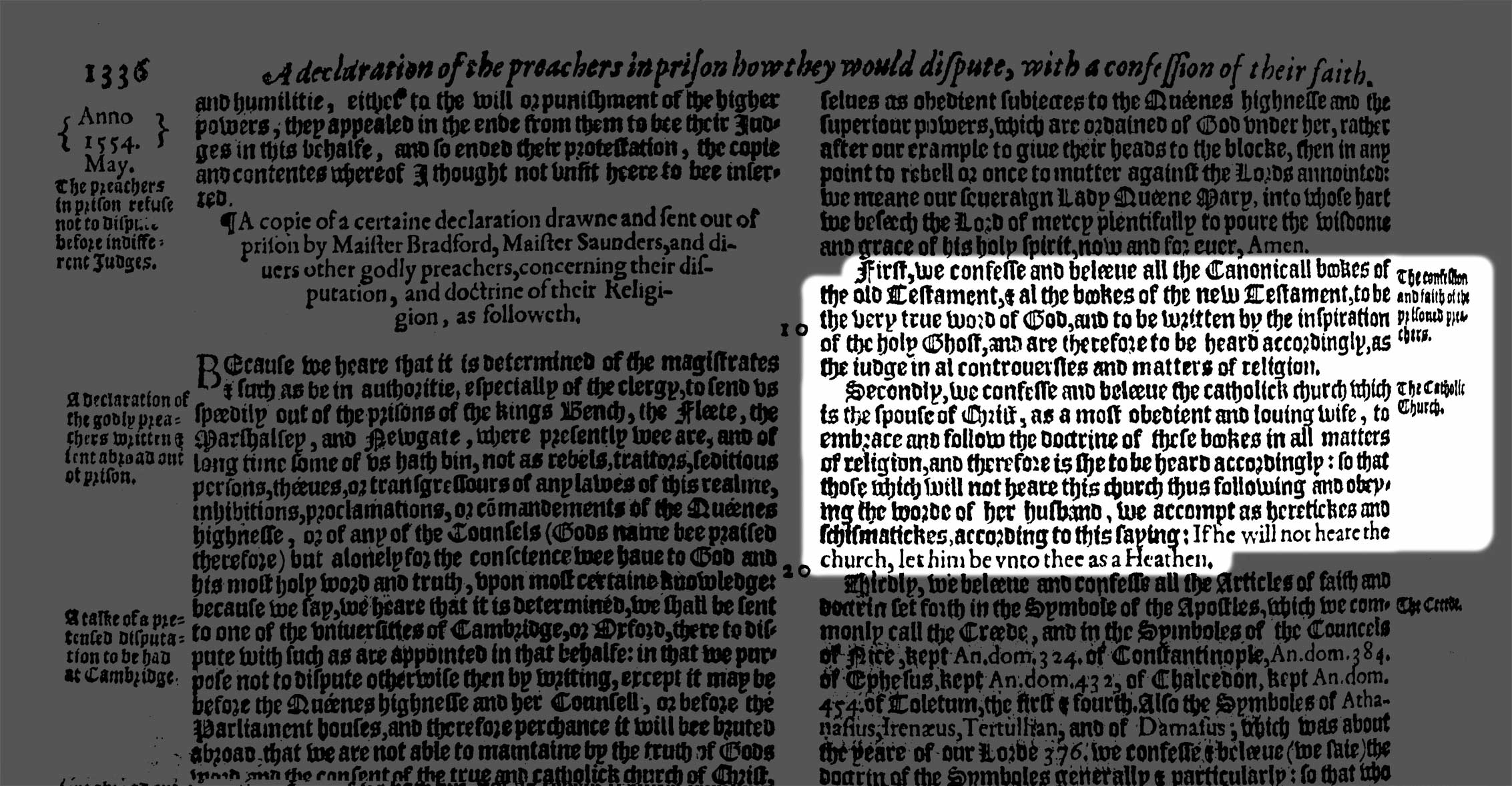
-Source: A copy of a certain declaration drawn and sent out of prison by Maister Bradford, Maister Saunders, and divers others (1554), in John Foxe, Acts & Monuments, vol. II (1597), p. 1336; full page.
John Philpot.
The examination of the constant martyr of Christ, John Philpot archdeacon of Winchester.
1555. A. D.
“As many as abode in the Ark of Noah, were not drowned by the flood of Noah. Even so, as many as abide in the true church of Christ, shall receive no hurt by all the blustering and corrupt waters, which the dragon that persecuteth the church into the wilderness doth in the Apocalypse cast out after her to the end to drown her therewith. You that stand in doubt of any thing by the suggestion of these new found heretikes, run to the pure catholike church of Christ for your sure instruction”
“For as an ancient Father S. Cyprian sayeth, He that hath not the church for his mother, hath not God for his God for his father. We have but one mother, sayeth Solomon in his Canticle (6:9), and she covereth to gather us under her wings, like a loving hen her chickens (Luke 13:34); and if we abide there, we are assured from all the ravening vermin of heretikes, and though there shall fall on every side of thee millions, yet shall they not approach near unto thee. But if after curiosity thou go out astray, some Kite or other will snatch thee up to the prince of the air, from whence thy fall will be great. If thou wilt be assured of the eternal kingdom of God, be stable in thy faith, flee from sects and heresies, and abide in the unity of Christ’s spouse his true church.”
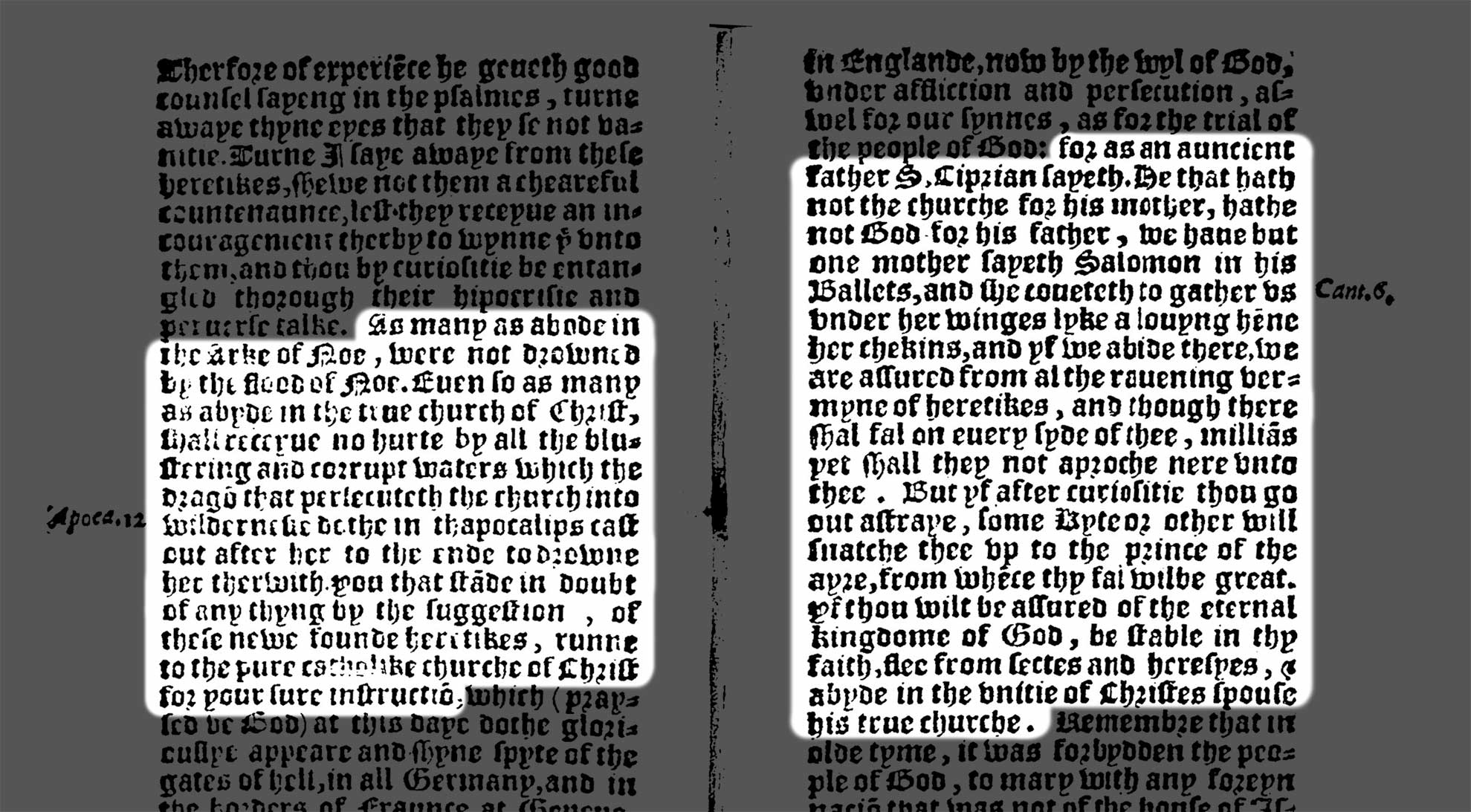
Nicholas Ridley.
Conferences of two holy martyrs of Christ, Nicholas Ridley and Hugh Latimer, during imprisonment.
1556. A. D.
“Of the Universal Church, which is mingled of good and bad, thus I think. Whensoever they which be chief in it, which rule and govern the same, and to whom the rest of the whole mystical body of Christ doth obey, are the lively members of Christ, and walk after the guiding and rule of His Word, and go before the flock towards everlasting life; then undoubtedly Councils gathered together of such guides and pastors of the Christian flock, do indeed represent the Universal Church; and being so gathered in the name of Christ, they have a promise of the gift and guiding of His Spirit into all truth.”
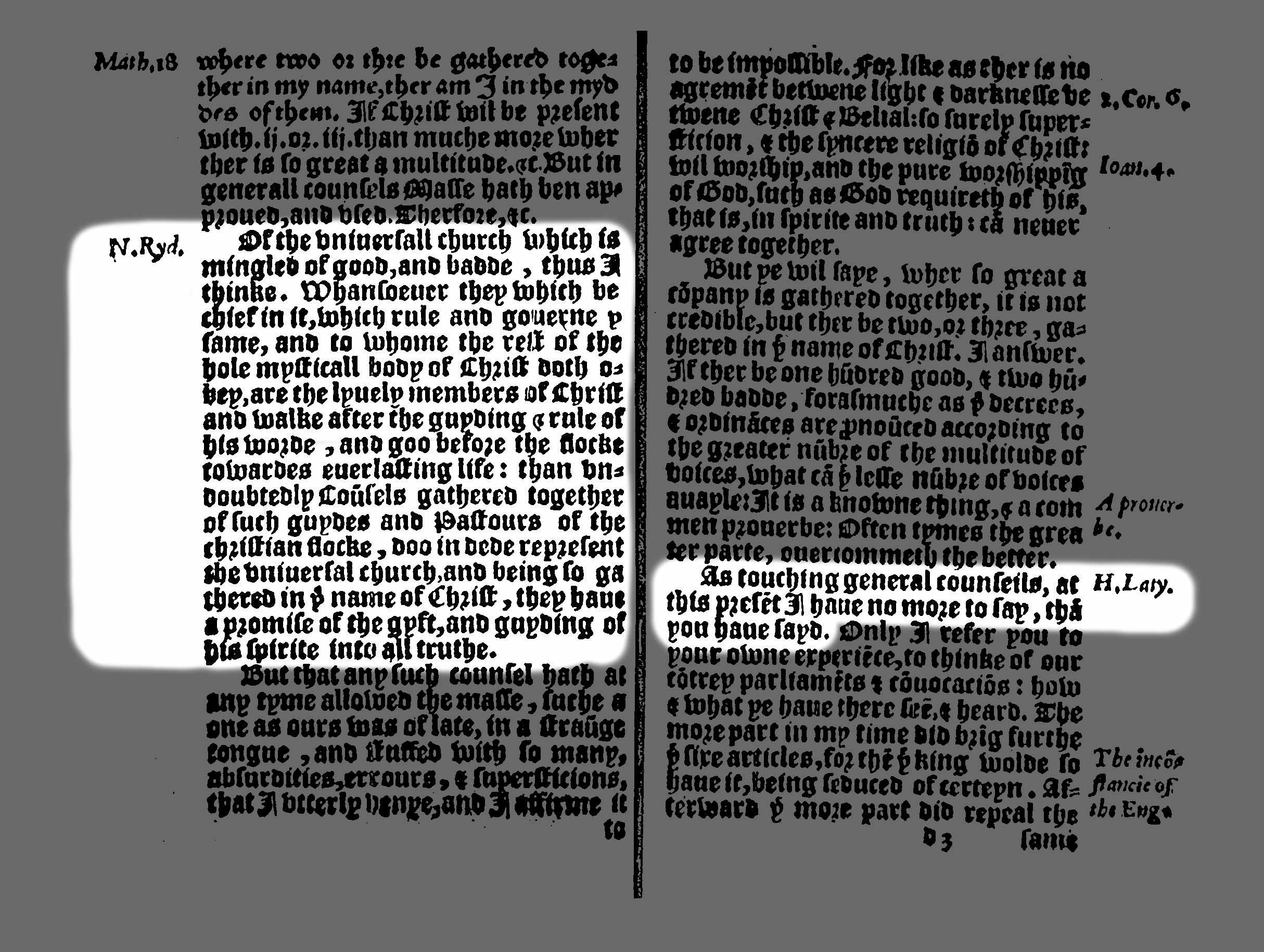
Source: Certayne godly, learned, and comfortable conferences betuuene the tuuo reuerende fathers and holye martyres of Christe, D. Nicolas Ridley late byshoppe of London, and M. Hugh Latymer, somtime bishop of VVorcester, duryng the tyme of their emprisonmentes (1556); cover page.
Hugh Latimer.
Conferences of two holy martyrs of Christ, Nicholas Ridley and Hugh Latimer, during imprisonment.
1556. A. D.
“As touching General Councils, at this present I have no more to say than you have said.”

Thomas Cranmer.
Archbishop, metropolitan, and martyr.
1556. A. D.
“… concerning my doctrine of the sacrament and other my doctrine, of what kind soever it be, I protest that it was never my mind to write, speak, or understand any thing contrary to the most holy word of God, or else against the holy catholicke church of Christ, but purely and simply to imitate and teach those things only, which I had learned from the sacred Scripture, and from the holy catholicke church of Christ from the beginning, and also according to the exposition of the most holy and learned Fathers and Martyrs of the Church.”
“… I am ready in all things to follow the judgment of the most sacred word of God, and of the holy catholicke church, desiring none other thing, than meekly and gently to be taught, if anywhere (which God forbid) I have swerved from the truth.”
“And I profess and openly confess, that in all my doctrine and preaching, both of the Sacrament, and of other my doctrine whatsoever it be, not only I mean and judge those things, as the catholicke church, and the most holy fathers of old with one accord have meant and judged, but also I would gladly use the same words that they used, and not use any other words, but to set my hand to all and singular their speeches, phrases, ways, and forms of speech, which they do use in their treatises upon the Sacrament, and to keep still their interpretation.”
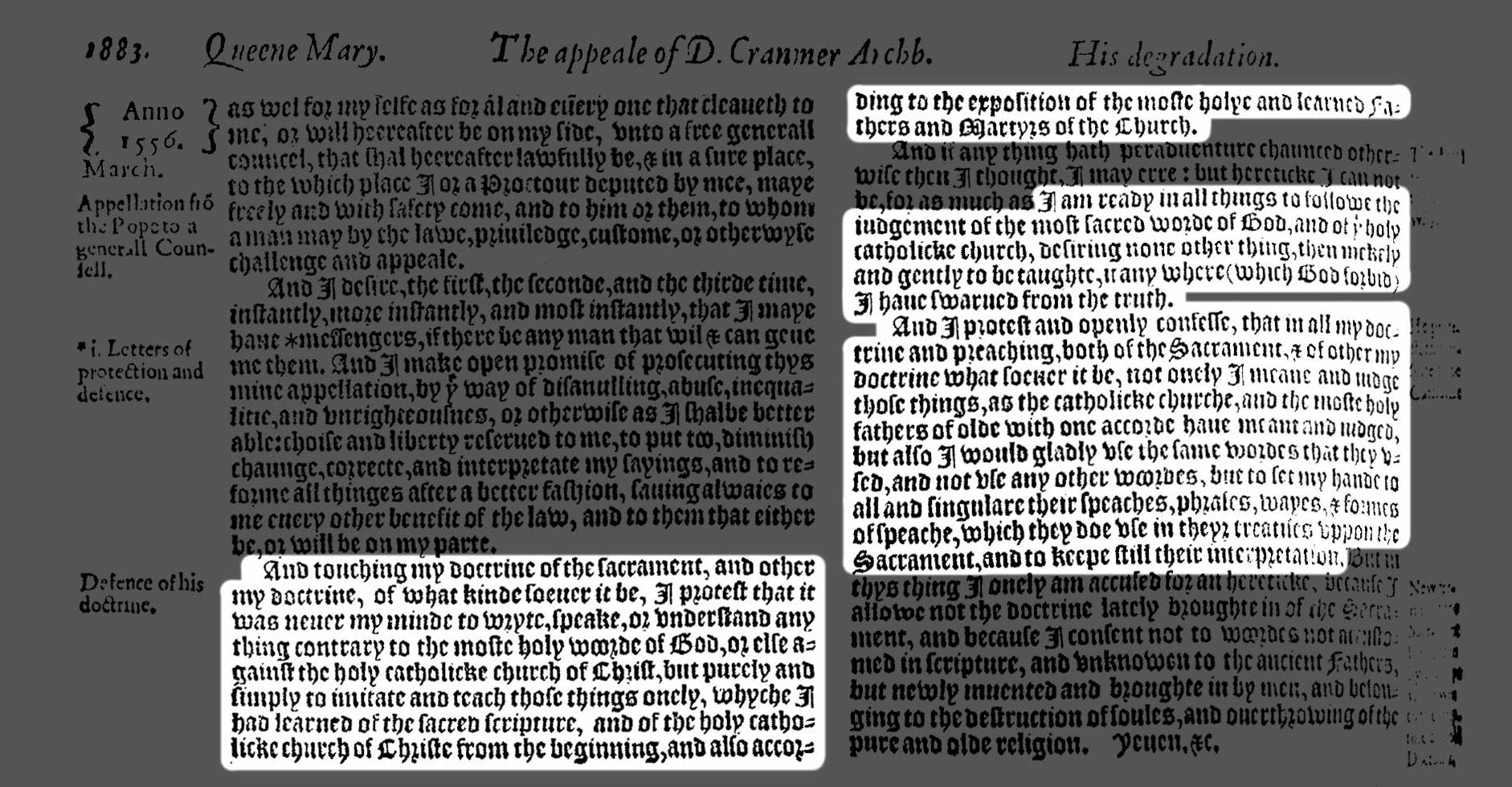
-Source: Thomas Cranmer, The Appeal of the archbishop of Canterbury from the Pope to the next General Council (1556), in John Foxe, Acts & Monuments, vol. II (1583), p. 1883; full page.
-Online: Miscellaneous Writings and Letters of Thomas Cranmer, vol. IV (1846), p.224. Google Books.
The Westminster Disputation.
R. Coxe, bishop and doctor,
D. Whitehead, doctor,
E. Grindall, doctor
E. Gest, master,
J. Aelmer, master,
J. Jewel, master.
March-April, 1559. A. D.
“Seeing that Christ is our only master, whom the father hath commanded us to hear: and seeing also his word is the truth, from the which it is not lawful for us to depart not one hair breadth, and against the which (as the Apostle saith) we can do nothing, we do in all things submit our selves unto this truth, and do protest that we will affirm nothing against the same.”
“And forasmuch as we have for our mother the true and catholike Church of Christ, which is grounded upon the doctrine of the Apostles and Prophets, and is by Christ the head in all things governed, we do reverence her judgement, we obey her authority as becometh children”
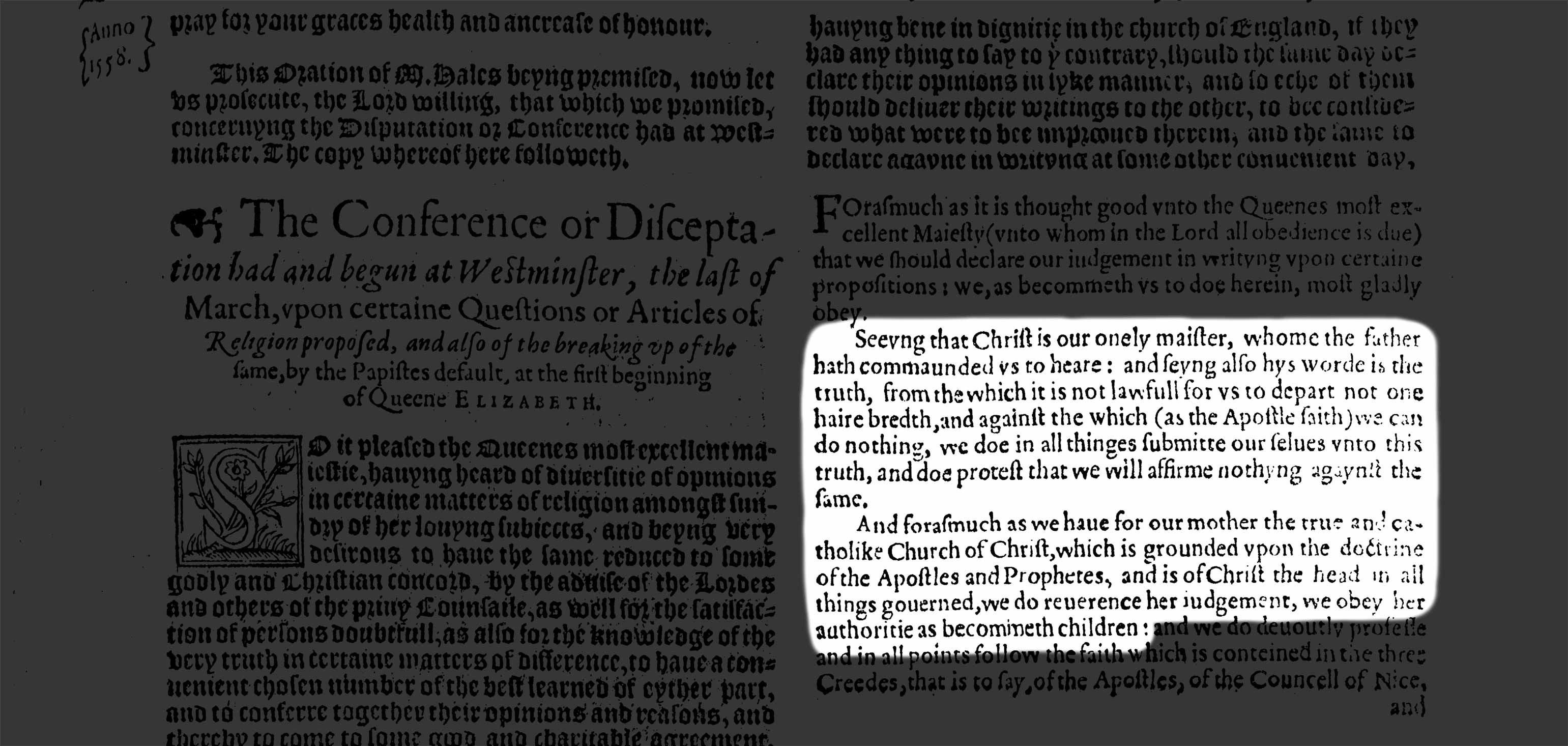
John Jewel.
“The Challenge Sermon” preached at Paul’s Cross, on the second Sunday before Easter.
April, 1559. A. D.
“If any learned man of all our adversaries, or if all the learned men that be alive, be able to bring any one sufficient sentence out of any old Catholike Doctor, or Father; Or out of any old general Council; or out of the holy Scriptures of God; or any one example of the Primitive Church, whereby it may be clearly and plainly proved, that […], or that […], or that […]. If any man alive were able to prove any of these articles, by any one clear or plain clause, or sentence, either of the Scriptures, or of the old Doctors, or of any old general Council, or by any example of the Primitive Church: I promised then that I would give over and subscribe unto him.”
“If any one of all our adversaries be able dearly and plainly to prove by such authority of the Scriptures, the old Doctors, and Councils, as I said before, that […], or that […], or that […]. If any one of all our adversaries be able to avouch any one of all these articles, by any such sufficient authority of Scriptures, Doctors, or Councils, as I have required; as I said before so I say now again, I am content to yield unto him, and to subscribe.”
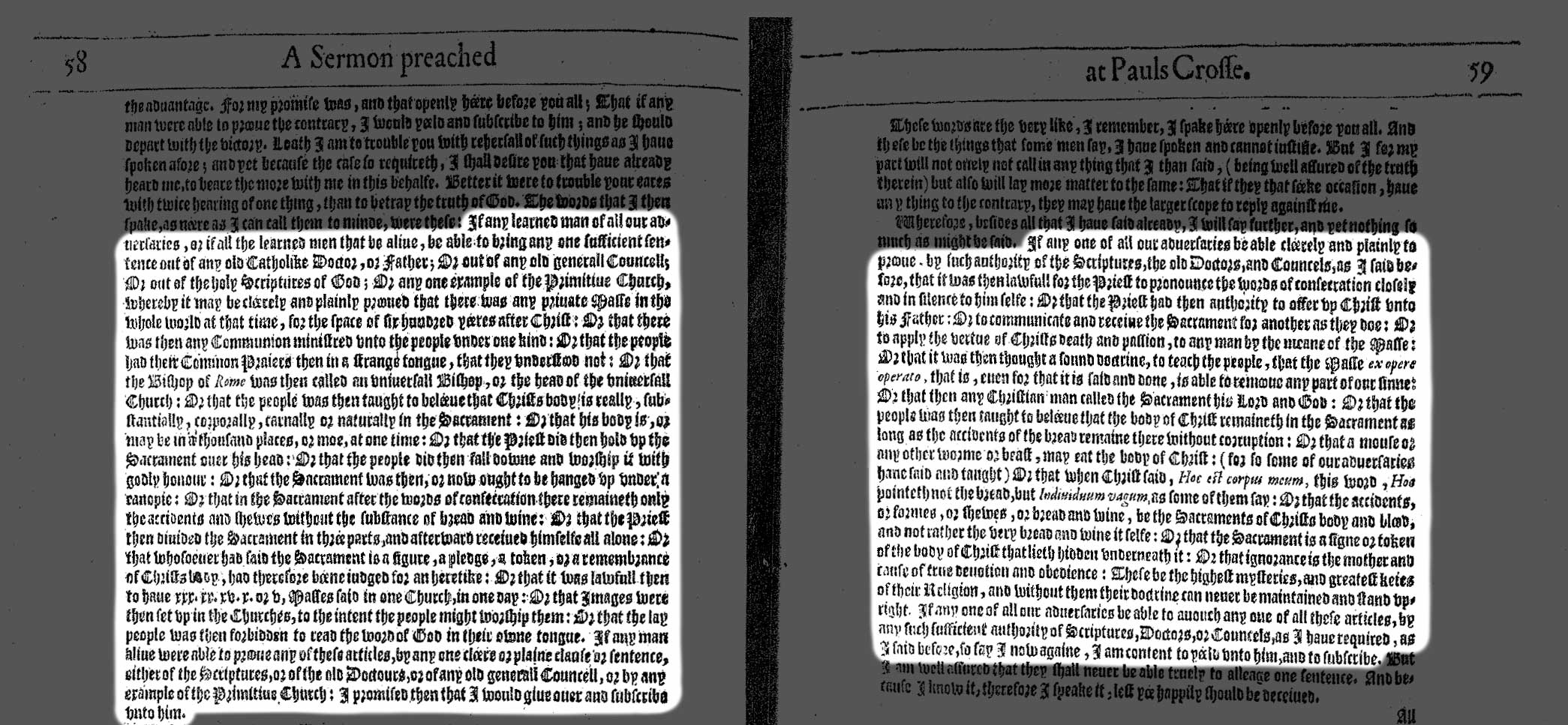
A declaration of doctrine.
May, 1559. A. D.
“… at no time hath the Subtle Serpent been more strong in his Wicked Members, and Deceitful Workers, to deface the Doctrine of the Gospel, and to slander the Setters forth of the same, than he hath shewed himself at this Time: […] most untruly reporting of us, that our Doctrine is detestable Heresy; that we are fallen from the Doctrine of Christ’s Catholick Church; that we be Subtle Sectaries; that we dissent among our selves; and that every Man nourishes and maintains his Personal Opinion”
“… we have neither swerved from the Infallible Truth of God’s written Word, neither yet from the Doctrine and Confession of Christ’s Catholick Church; as we by God’s Grace shall be able and ready at all times evidently to shew unto all Men.”
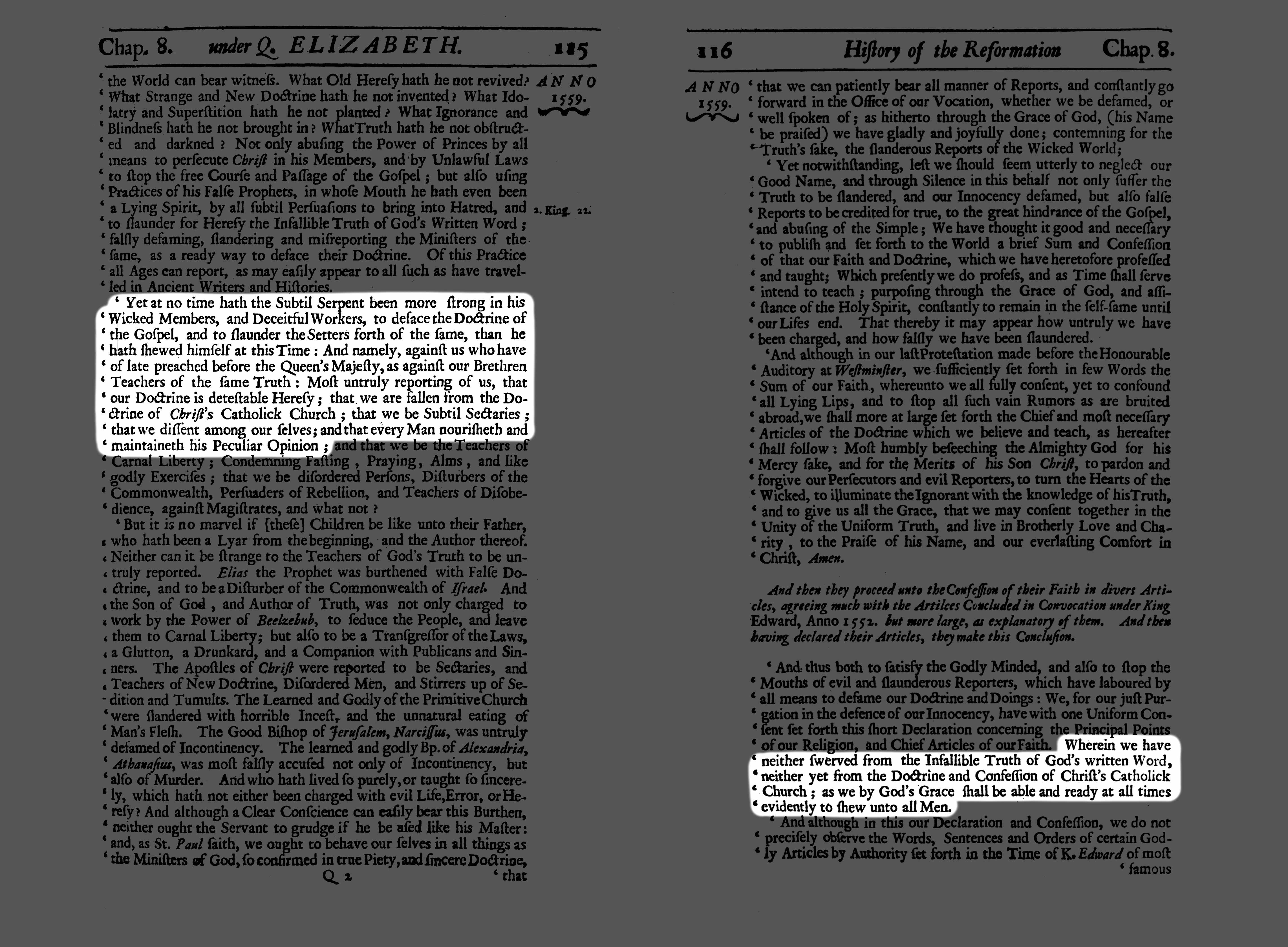
-Source: “A Declaration of Doctrine” (1559), in John Strype, Annals of the Reformation, ch. viii (1709), p.114; full page. Google Books.
The Articles of Religion.
[Official document]
1563. A. D.
Article 20, Of the Authority of the Church. “The Church hath power to decree rites or ceremonies, and authority in controversies of faith…”
“… the Church be a witness, and a keeper of holy writ”
Article 33, Of Excommunicate persons. “The person which by open denounciation of the Church, is rightly cut-off from the unity of the Church, and Excommunicated, ought to be taken from the whole multitude of the faithful, as an heathen and Publican, until he be openly reconciled by Penance, and received into the Church by a judge that hath authority thereunto.”
Articulum XX. De Ecclesiae autoritate. “Habet Ecclesia Ritus statuendi ius, & in fidei controversiis autoritatem…”
“… Ecclesia sit divinorum librorum testis & conservatrix”
Articulum XXXIII. Excommunicati vitandi sunt. “Qui per publicam Ecclesiae denuntiationem rite ab unitate ecclesiae praecisus est & excommunicatus, is ab universa fidelium multitudine, donec per poenitentiam publice reconciliatus, fuerit, arbitrio Judicis competentis, habendus est tanquem Ethnicus & Publicanus”
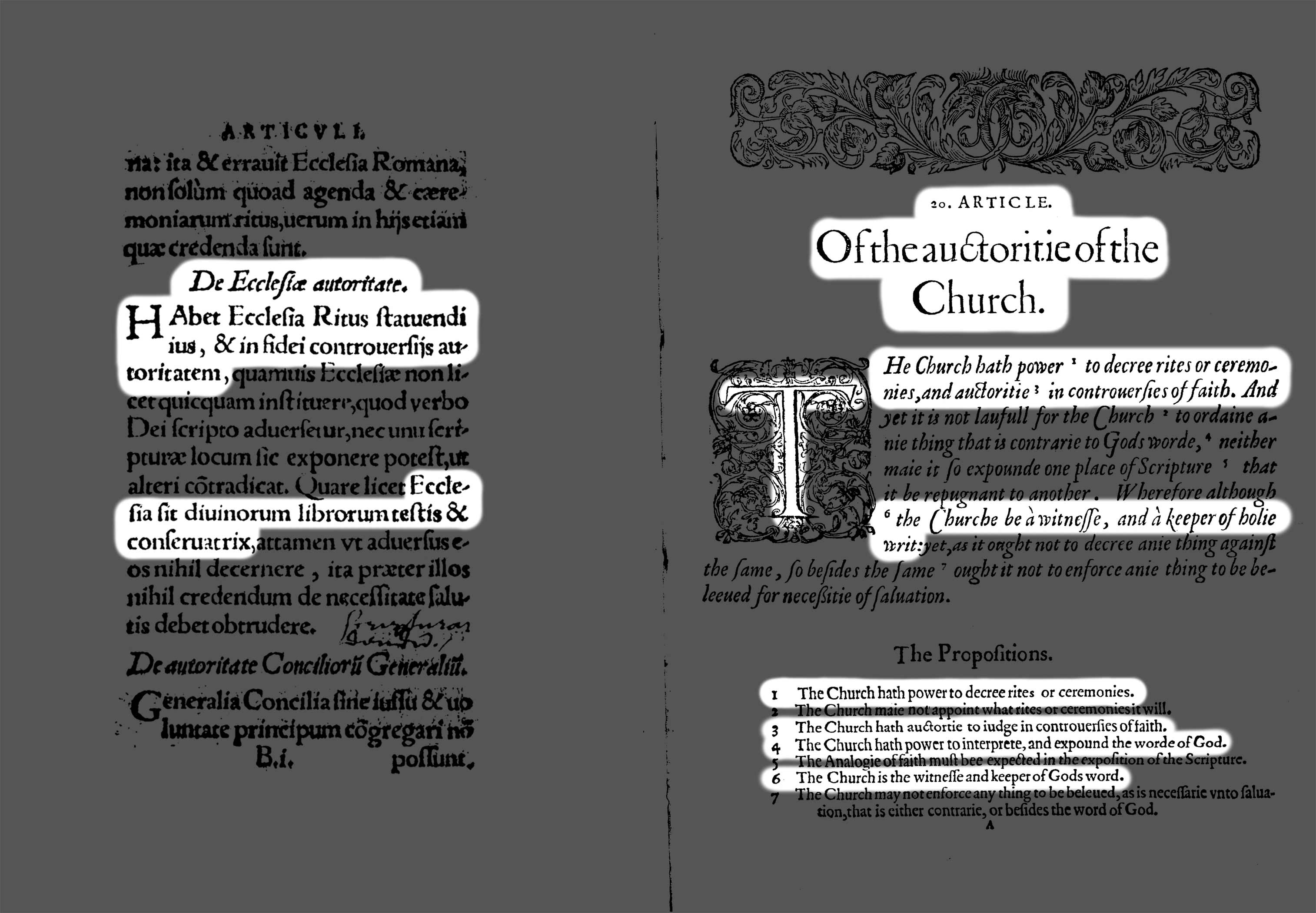
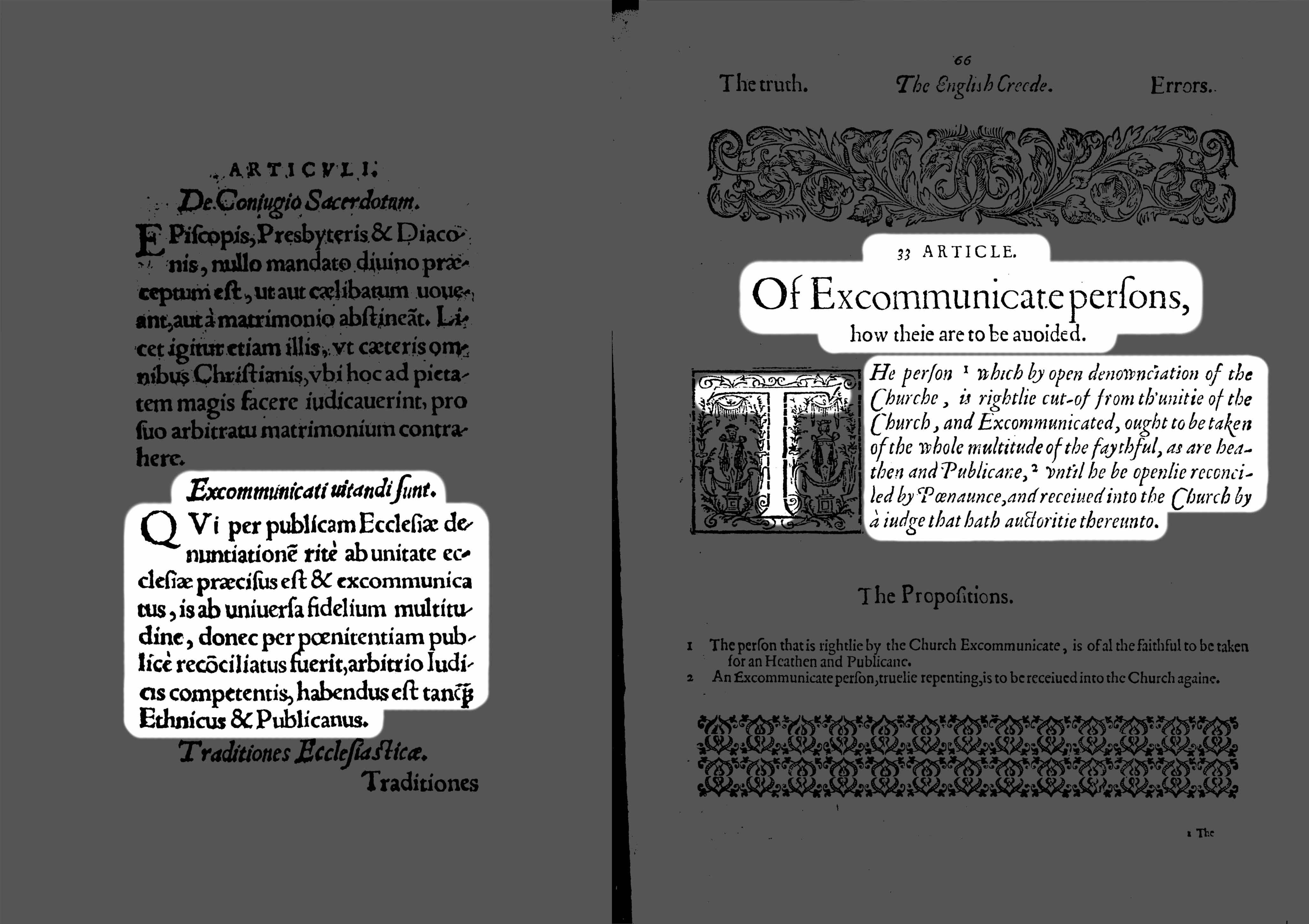
-Source (latin): Articuli de quibus in synodo Londinensi anno Domini iuxta ecclesiae Anglicanae computationem M.D.LXII ad tollendam opinionum dissensionem & firmandum in uera religione consensum (1563); page 1, page 2.
Alexander Nowell.
“The Large Catechism”, A catechism, or first instruction and learning of Christian religion.
[Official document]
1570. A. D.
Master: “Dost thou then affirm that all things necessary to godliness and salvation are contained in the written word of God?”
Student: “Yea, for it were a point of intolerable ungodliness and madness to think, either that God hath left an imperfect Doctrine, or that men were able to make that perfect which God left imperfect. Therefore the Lord hath most straightly forbidden men, that they neither add any thing to, nor take any thing from his word, nor turn any way from it, either to the right hand or to the left.”
Master: “If this be true what thou sayest, to what purpose then are so many things so oft in Councils and ecclesiastical assemblies decreed, and by learned men taught in preaching, or left in writing?”
Student: “All these things serve either to expounding of dark passages of the word of God, and to take away controversies that rise among men, or to the orderly establishing of the outward governance of the Church, and not to make new articles of Religion.” […]
Master: “Dost thou then think that we are bound to hear such teachers and expounders?”
Student: “Even as the Lord himself, if he were present; so long as they teach only those things which they have received from the Lord. Which he himself witnesseth, saying, he that heareth you heareth me, he that despiseth you despiseth me. Yea and moreover to these preachers of his word he hath given the power to bind and loose, that whose sins soever they by the word of God shall pardon or detain on earth, the same shall be pardoned or detained in heaven.”
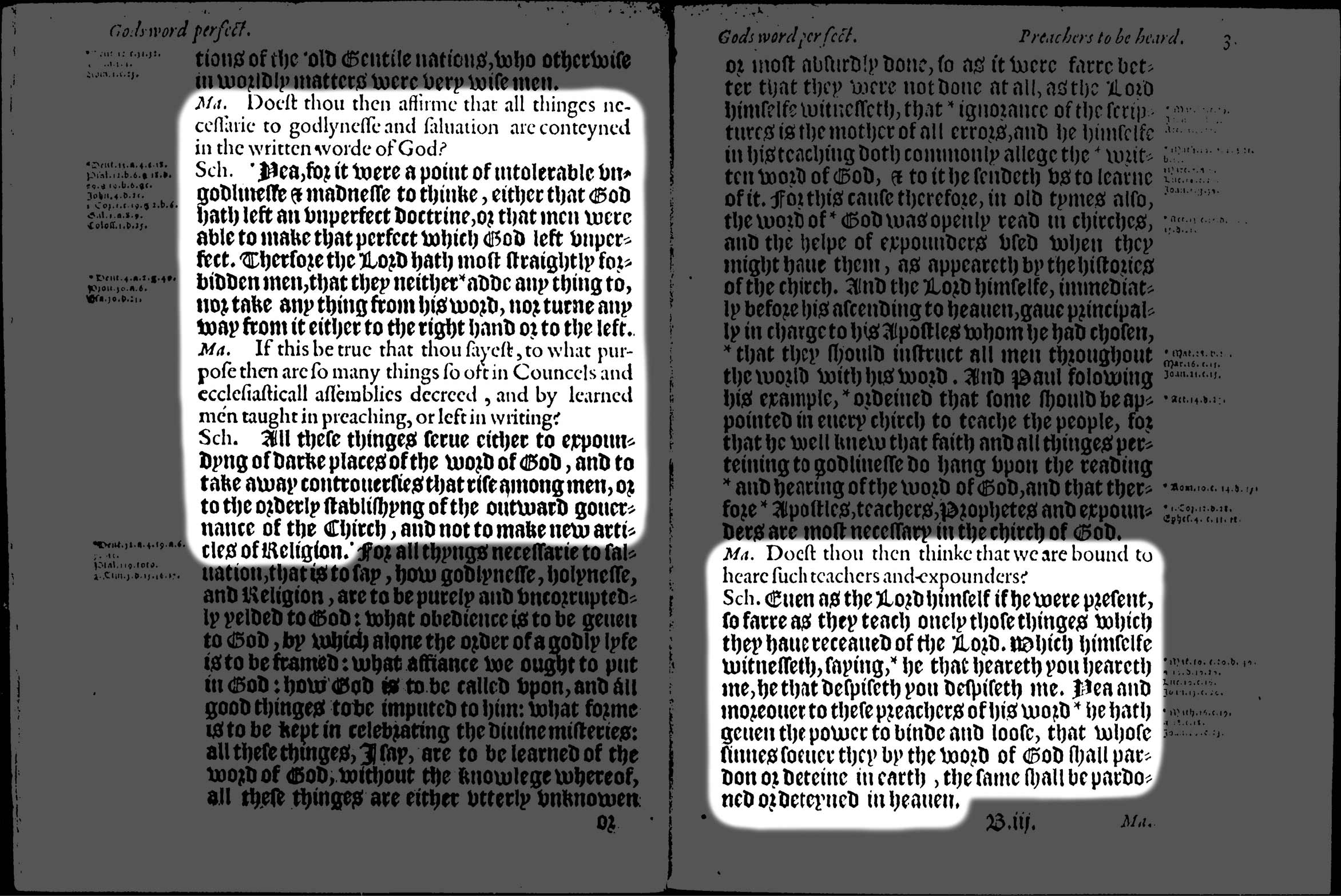
A Form of Public Penance.
“A form of penance laid before the synod by the archbishop of Canterbury, with his directions for it.”
[Official document]
1580. A. D.
Archbishop Edmund Grindal: “First, I wish at every public penance a sermon, if it be possible, be had. Secondly, in the same sermon the grievousness of the offence is to be opened; the party to be exhorted to unfeigned repentance, with assurance of God’s mercy, if they so do, and doubling of their damnation, if they remain either obstinate, or feign repentance, where none is, and so lie to the Holy Ghost.
“… Let the offender be set directly over against the pulpit, during the sermon or homily, and there stand bare headed with the sheet, or other accustomed note of difference, and that upon some board raised a foot and a half at least above the church floor, that they may be ‘in loco editiore, et eminentiores omni populo
,’ in an higher place and above all the people.”
“… Provided always that order be given by the ordinaries, when they assign penances, that if the penitents do show themselves irreverent, or impenitent at their penances, that then their punishments be reiterated”
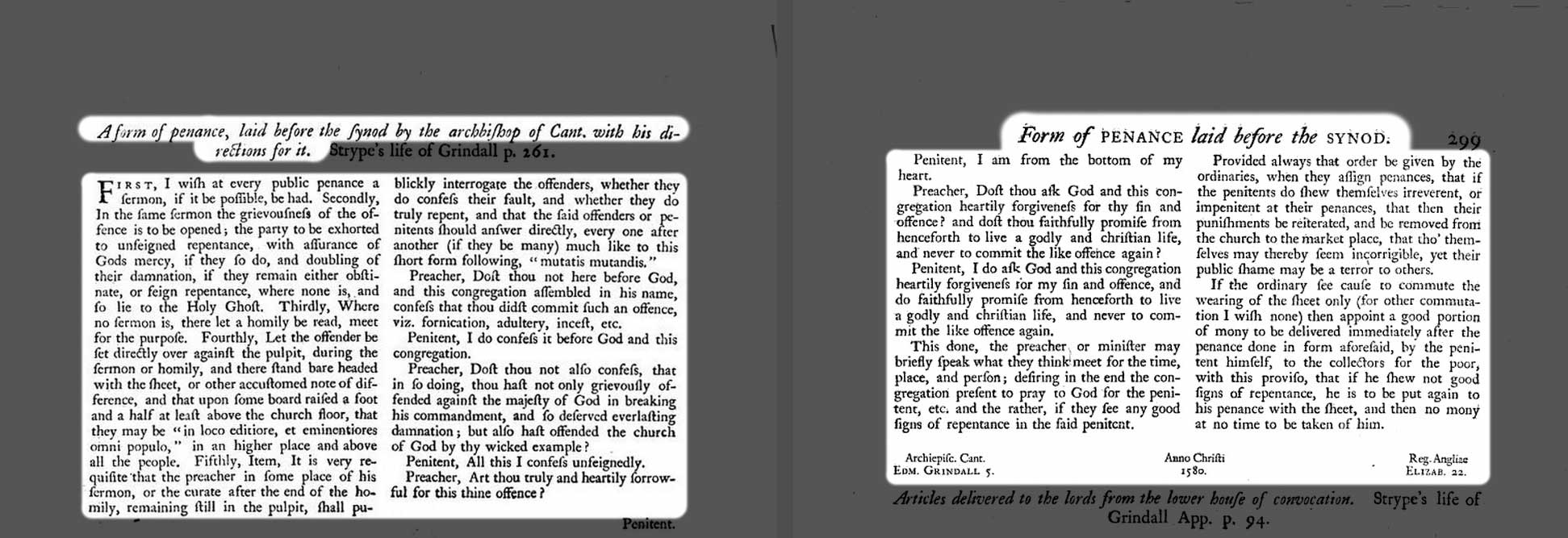
John Jewel.
A treatise of the Sacraments.
1583. A. D.
“I will declare the whole matter simply, and plainly, and submit my self to the understanding and capacity of all men. That which I will utter herein shall not be of myself, but of the fathers of the Church: not of those which have been of later years, but of the most ancient: not of the Heretiques, but of the most Catholique, which ever have been the enemies and confounders of Heretiques. I will show the use, and order, and faith of the primitive Church which was in the times of the Apostles, and of Tertullian, Cyprian, Basil, Nazianzen, Jerome, Augustine, Chrysostom, and other Catholique and Godly learned fathers. Let no man regard me, or my speech: I am only a finger: these are clear and bright stars. I do but show them unto you, and point them, that you may behold them. God give us grace that we may see them truly, and by them be able to guide and to direct our way. Let us lay aside all contention, and quietly hear what shall be spoken. Whatsoever shall be said, if it be true, if it be ancient, if it be Catholique, if it be so clear as the sun beams, let us humble our hearts, and believe it.”
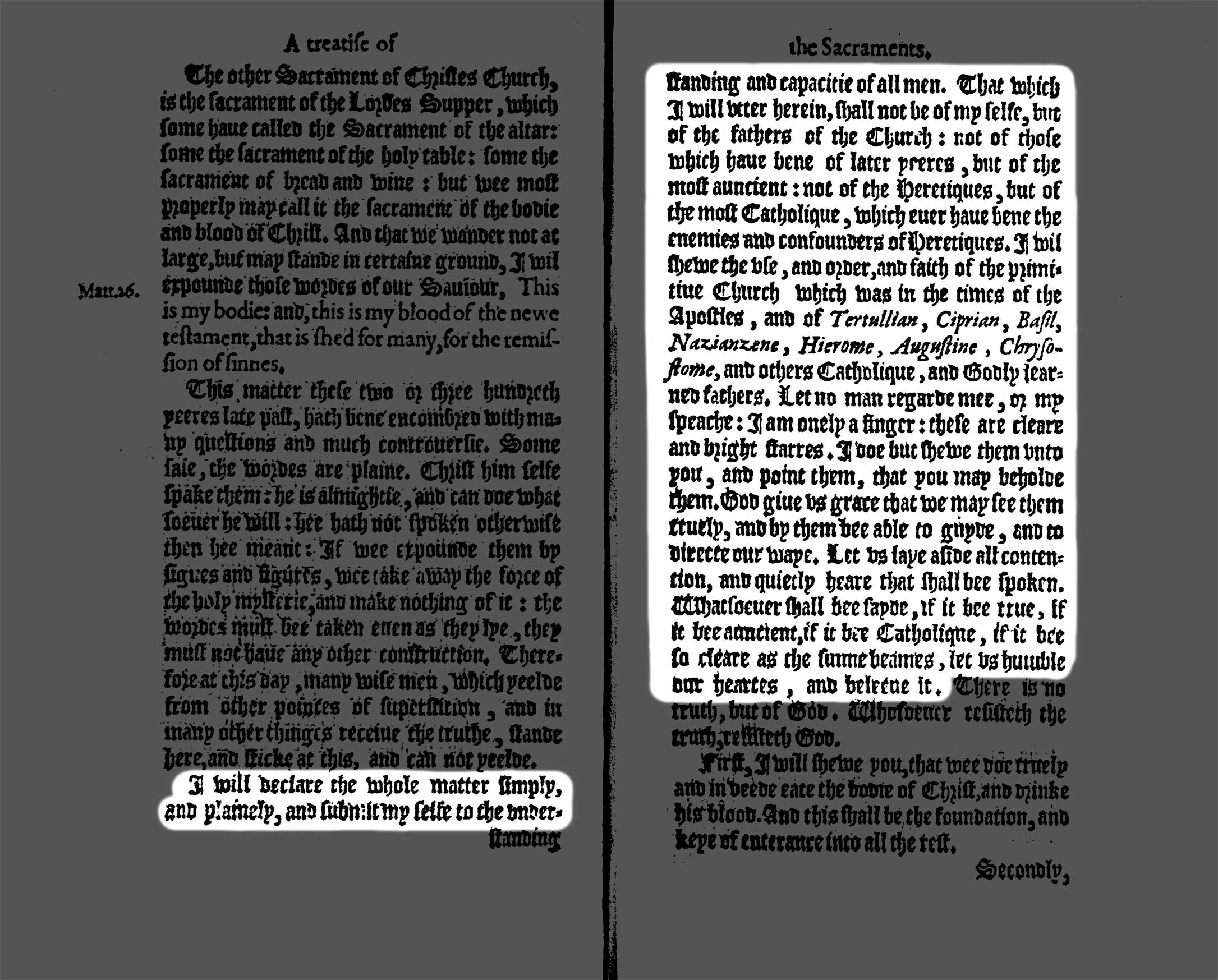
-Source: Certaine sermons preached before the Queenes Maiestie, and at Paules crosse by the reuerend father Iohn Iewel … ; whereunto is added a short Treatise of the sacraments, gathered out of other his sermons made vpon that matter, in his cathedrall church at Salisburie (1583); cover page.
Richard Bancroft.
A Sermon on 1 John iv. 1, Preached at Paul’s Cross.
1588. A. D.
“Read the Scriptures, but with sobriety. If any man presuming upon his knowledge, seek farther than is meet for him, besides that he knoweth nothing as he ought to know, he shall cast himself into a labyrinth and never find what he seeketh for. God hath bound himself by his promise unto his church, of purpose that men, by her good direction, might in this point be relieved. To whose godly determination in matters of question, her dutiful children ought to submit themselves without any curious or willful contradiction. I could bring many authorities to this effect. Those things (saith Athanasius) which have been proved and decreed by so many and so worthy Bishops, Supervacaneum est denuo in judicium revocare: it is in vain to call again into question.”
“When certain men in the council of Chalcedon began to dispute of some points determined before by the council of Nice, the fathers there assembled said all with one voice: Si quis retractat, anathema sit; si quis super ista inquirit, anathema sit; maledictus qui addit; maledictus qui aufert; maledictus qui innovat; If any retract, accursed be he; if any inquire of these things, accursed be he; accursed be he that addeth; accursed be he that diminisheth; accursed be he that innovateth.”
“The Emperors Valentinian and Martian thought it very unmeet that those things which had been once judged of, and well decided by the decrees of godly synods, should again be debated and disputed upon; and both they and divers others made very godly laws for the better containing of busy heads within the compass of this christian modesty. And surely it is a very true doctrine, that when councils and synods, being lawfully assembled and directed with God’s spirit, do resolve upon matters in question, that private men should content themselves therewith.”
“But touching Ecclesiastical persons it was commanded about 1270. years ago, that certain men, having by schism and heresy divided themselves from the church of God, and rent asunder by their factions the peace thereof, should not again be received or admitted before they had subscribed to the constitutions of the church. Thus the words stand in the eight canon of the council of Nicea. Ante omnia hanc habeant ab iis confessionem, quam per scripturam exigi oportet, ut fateantur se cum omni consensu, ecclesiae Catholicae statuta observaturos:
Let them first take of them this confession, and that under their hand-writing, that they promise with all consent, to observe the statutes of the catholike church.”
“Whereas therefore we have at this time many amongst us […] searching and trying to make new quarrels of matters before compounded, you see what spirits they are, and need no farther trial to discern them. God grant unto them more humble and sober minds, that they may no longer continue in this rebellion against the church of God.”
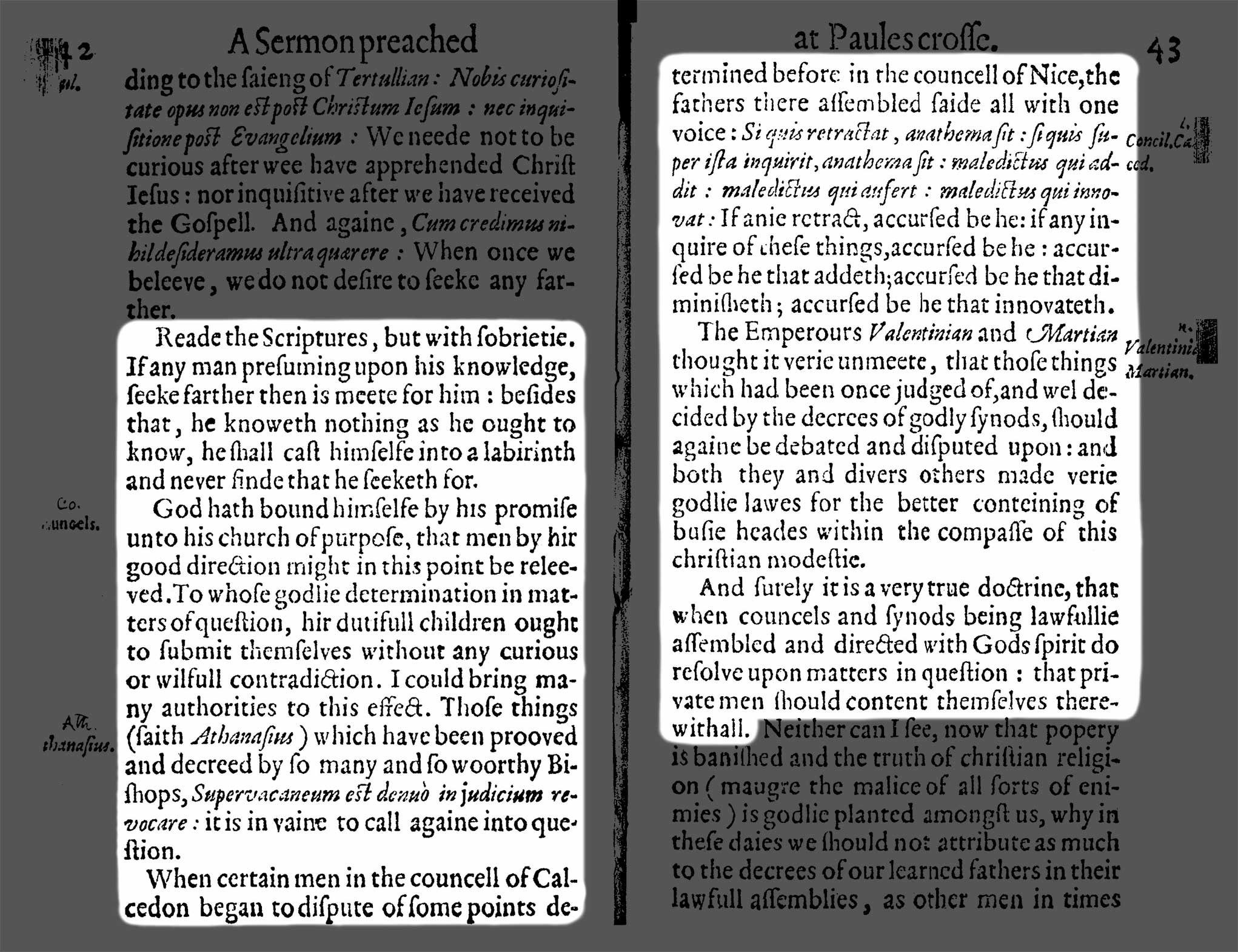
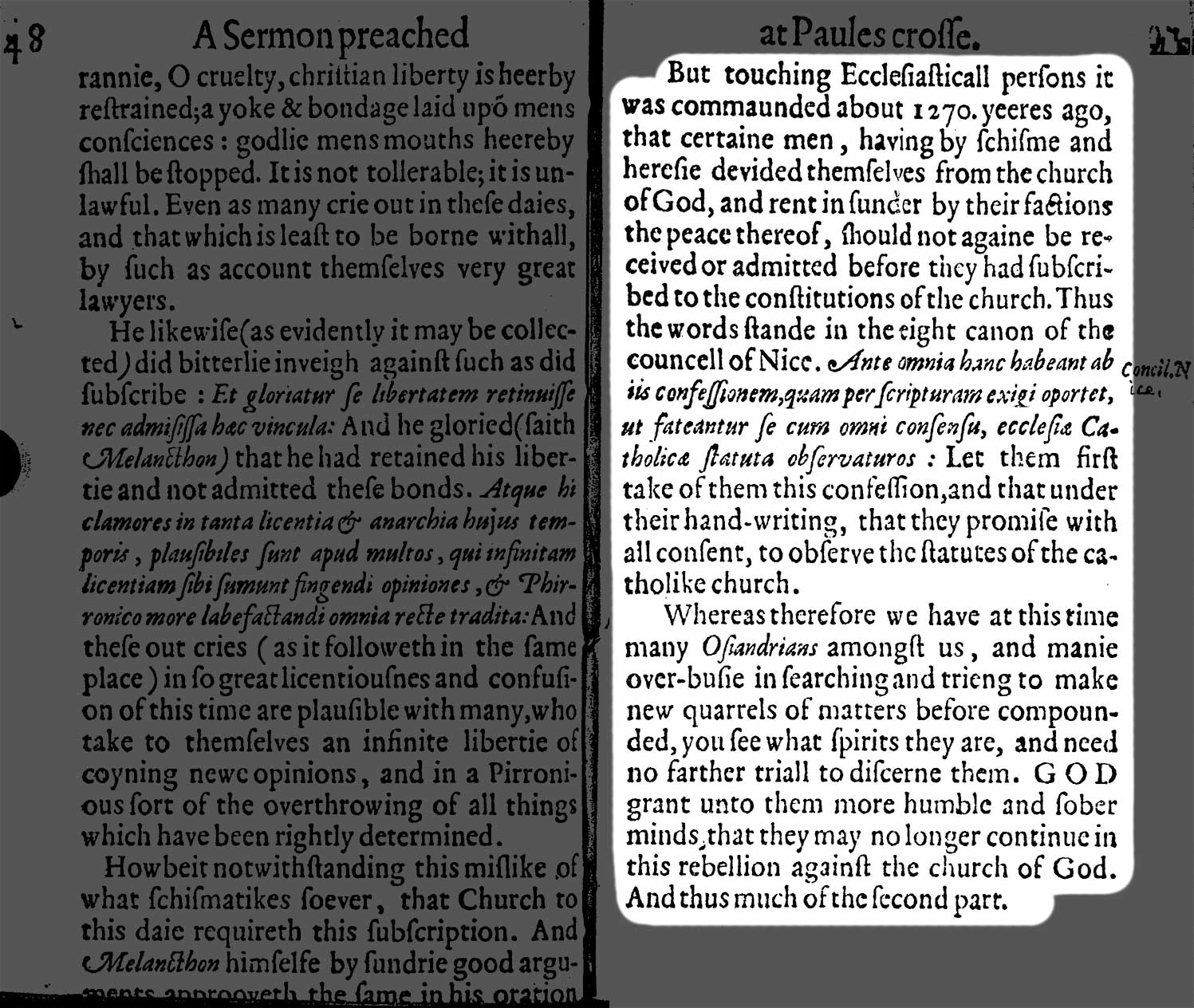
-Source: A sermon preached at Paules Crosse the 9. of Februarie being the first Sunday in the Parleament, Anno. 1588. by Richard Bancroft D. of Divinitie, and chaplaine to the right honorable Sir Christopher Hatson Knight L. chancelor of England (1588); cover page. Images for the second plate: page 1, page 2.
Matthew Sutcliffe.
A Treatise upon Ecclesiastical Discipline
1590. A. D.
“Seeing the fathers with one consent throughout the world received the constitution of bishops, that it came from the spirit of God by the ministry of the Apostles: for it is not the power of man, that on a sudden can move men’s hearts generally to receive one order established, but the effectual work of God’s spirit. […] I believe that those things which were by godly fathers gathered in God’s name, and consenting together, defined & received, that they were also from the holy Ghost, although not of like authority with scriptures.”
“Seeing the holy fathers say it is a divine institution; the babble of contentious fellows against such authority weighs not so much as a pepper grain against a woolsack.”
“That which ancient general councils, which this realm do approve, do decree, that it is not by every light fellow to be reproved; and he rather doth deserve stripes than words, who will disallow that which all general councils have allowed, not being contrary to the word of God, which of those councils cannot be presumed.”
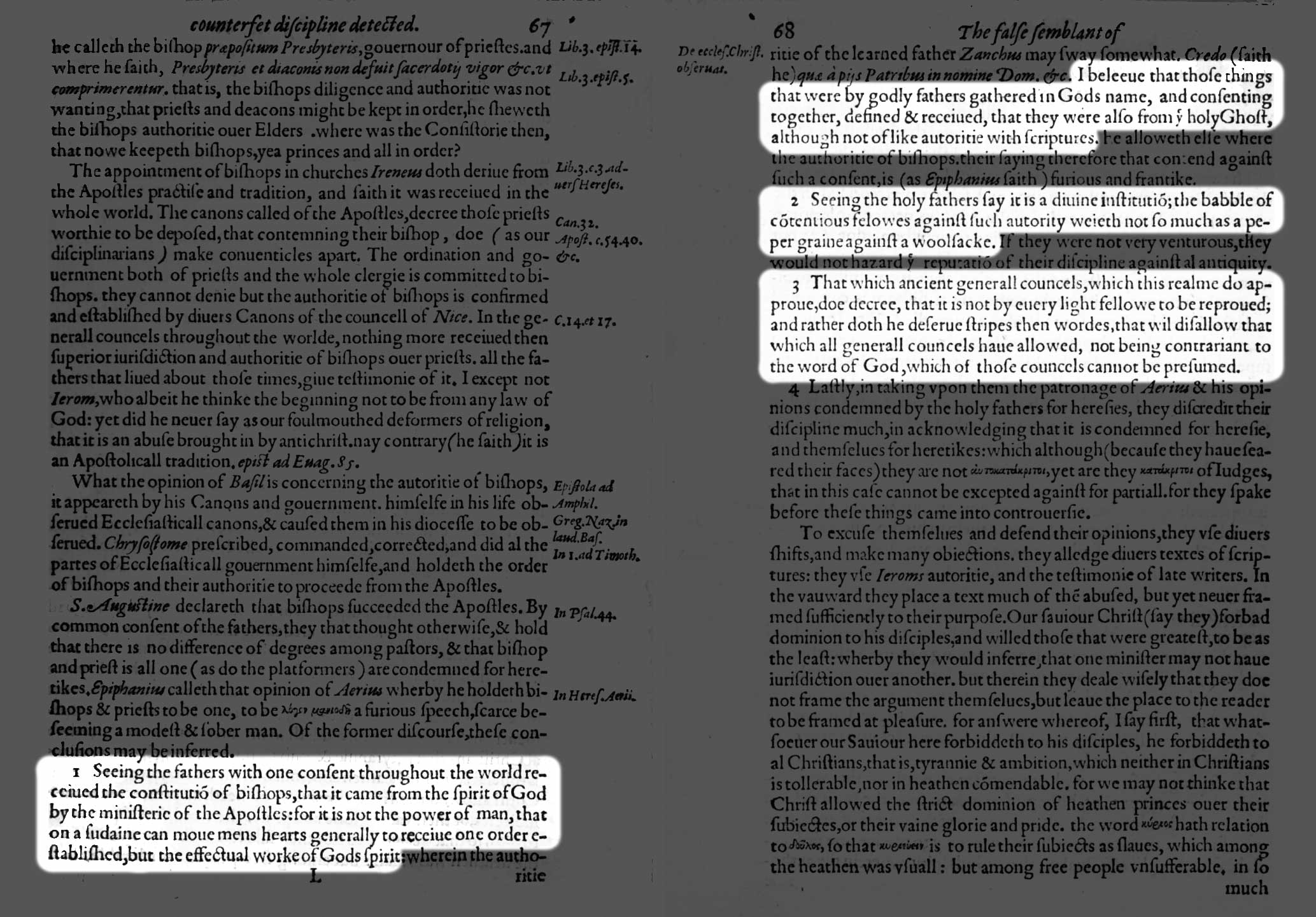
-Source: Matthew Sutcliffe, A Treatise of Ecclesiastical Discipline: Wherein that confused form of government, which certain under false pretence, and title of reformation, and true discipline, do strive to bring into the Church of England, is examined and confuted (1590); cover page. Google Books.
On Presbyteries, that novel form of government in the Christian Church.
1591. A. D.
p.119: “The degree of Bishops over the presbyters, as confirmed by Synods and proved from the Fathers, began from the time of the Apostles, and never condemned except of late, and when of late only from the shadows, and even then badly. All the heretics who are opposed to it have been condemned: for it is of divine origin.”
(latin): “Episcoporum supra presbyteros gradum, cum a Synodis confirmetur, a patribus tanquam divina probetur, coeperitque Apostolorum temporibus, & nunquam nisi nuper, a nuper exortis tenebrionibus condemnata fuerit, omnesque qui contra senserunt, pro haereticis habiti sint: divinam esse eiusdem originem.”
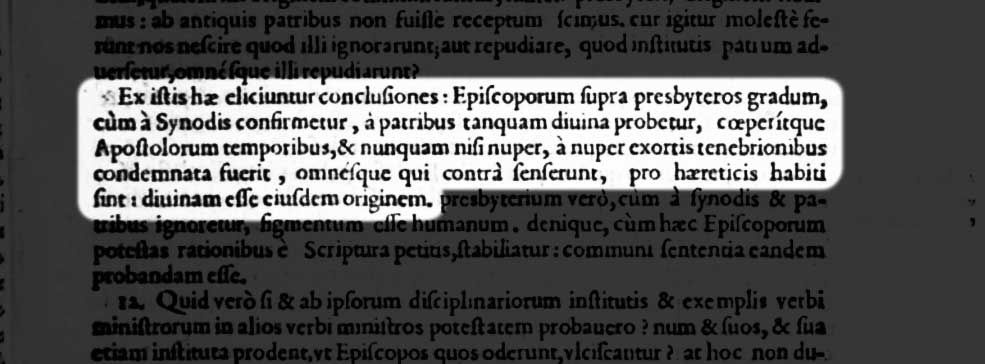
Hadrian Saravia.
On the Various Degrees of the Ministers of the Gospel.
1590. A. D.
“… since [church government] came immediately from God, men cannot alter it by their own choosing. Nor is it necessary. For the divine wisdom has so tempered this polity, that it opposes itself to no form of civil government… It appears to me, that the bishops are necessary to the church, and for that discipline and government of the Church to be best and divine, where the pious Bishops, together with valid presbyters [episcopally ordained], administer by the rule of God’s word and ancient councils.”
“From what has been said about the ministers of the gospel, as instituted by the Lord, left to the churches by the apostles, confirmed by the unanimous consent of the fathers and councils and the practice of the universal church, any one may perceive, that the form of regimen, according to which presbyters are subject to bishops as their superiors, and bishops to their patriarchs and Metropolitans, is not a human but a divine institution, established by God just as much in the old as well as in the new testament.”
(latin) “… quoniam enim proxime a Deo est profecta, eam pro arbitrio suo homines mutare non possunt, nec necesse est. Nam sic eam temperavit divina sapientia, ut nulli civilis regiminis formae adversetur… Quod me attinet, episcopos ecclesiae necessarios arbitror, & eam disciplinam & gubernationem Ecclesiae esse optimam & divinam, quam pii Episcopi, cum veri nominis presbyteris, ex praescripto verbi Dei & veterum conciliorum administrant.”
“… ex his quae dixi de evangelii ministeriis a Domino institutis, & ab apostolis qui sequuti sunt ecclesiae relictis, patrumque & conciliorum unanimi consensu, & totius ecclesiae usu, cognoscere quivis potest, humanum non esse illud regimen, in quo presbyteri parent superioribus episcopis, & episcopi suis patriarchis & Metropolitanis, sed divinum, atque a Deo tam in veteri quam novo testamento institutum.”
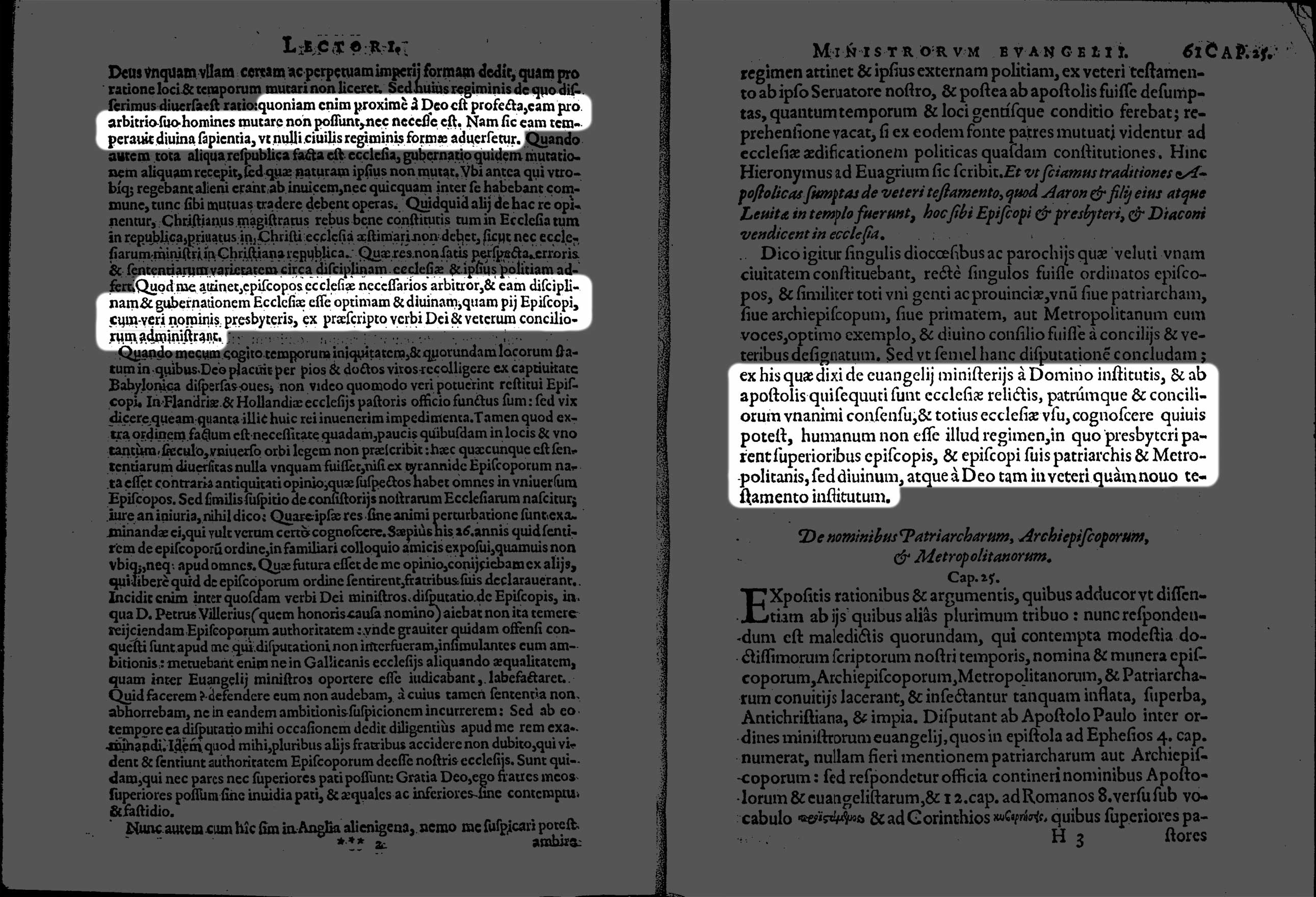
-Source: Hadrian Saravia, De Diversis Ministrorum Evangelii Gradibus / Of the diuerse degrees of the Ministers of the Gospell (1590); page 1, page 2. Cover page.
-Online: De Diversis Ministrorum Gradibus (1590). Google Books.
-Online: Of the diuerse degrees of the Ministers of the Gospell (1591). Google Books.
Of the Honor which is due unto the Priests and Prelates of the Church.
1591. A. D.
“Of the honor which is due unto Priests and Prelates of the Church.”
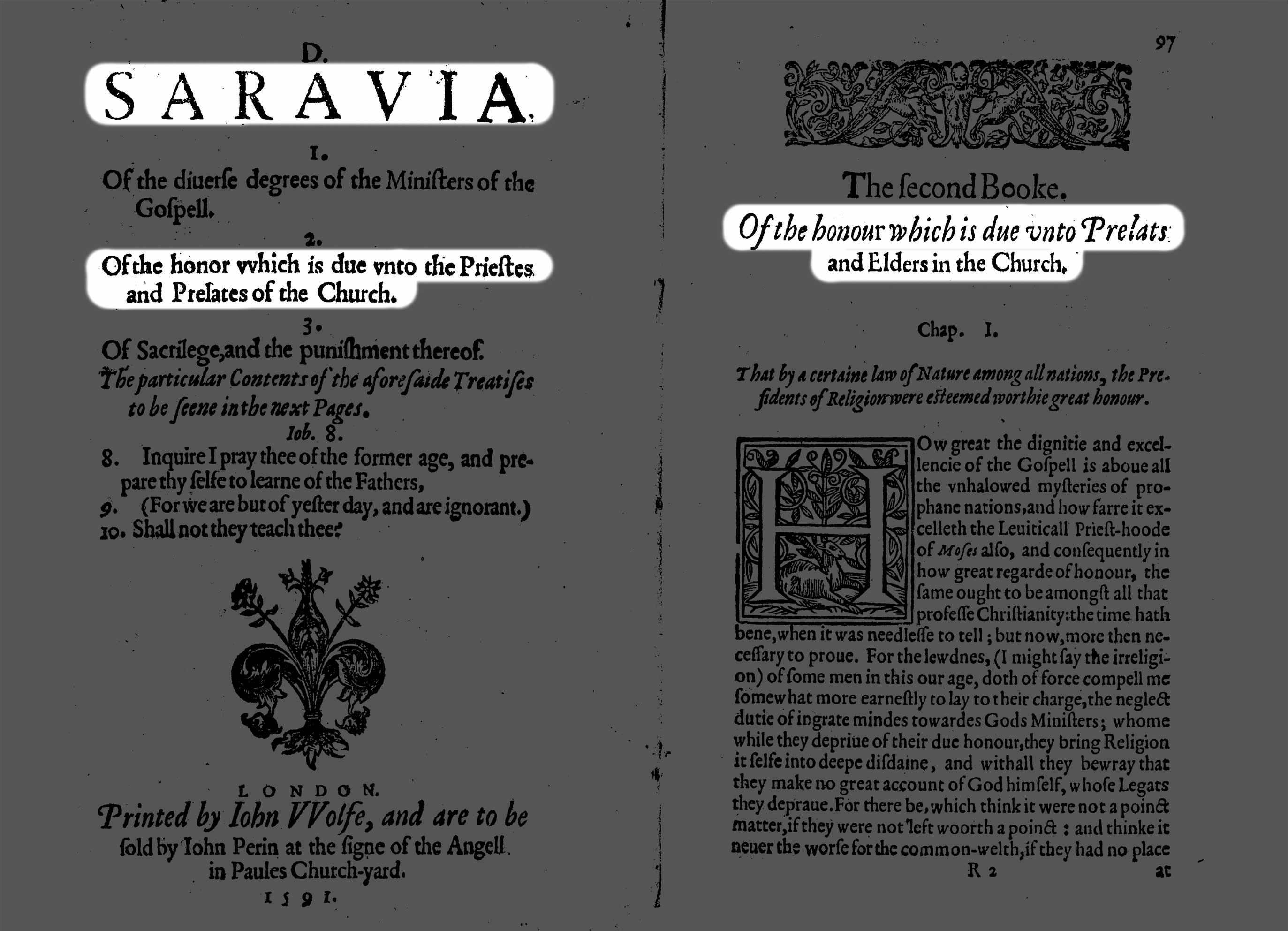
-Source: Hadrian Saravia, Of the honour which is due unto Priests and Prelates of the Church (1591); cover page.
Anthony Marten.
A Reconciliation of all the Pastors and Clergy of the Church of England.
1590. A. D.
“Now therefore since this kind of government by Bishops is found to be the very ordinance of Christ, the practice of the Apostles while they lived, and the constant order of the universal Church, before that Antichrist abused the same, what objection can there be made against it? If they find that the bishops do anything against it, what cause can they allege, what scruple of conscience can they make, why they should not submit them selves thereunto? If they find that the bishops do anything against the commandment of God, or that they execute not those things which are committed unto them, like faithful and just stewards of God, let those things be declared, but let not the just government, whose authour is Christ and the Apostles, and whose protector is the lawful and Godly Magistrate, be blamed. Let the fault be laid where it is found, but let not the Lord’s institution be altered.”
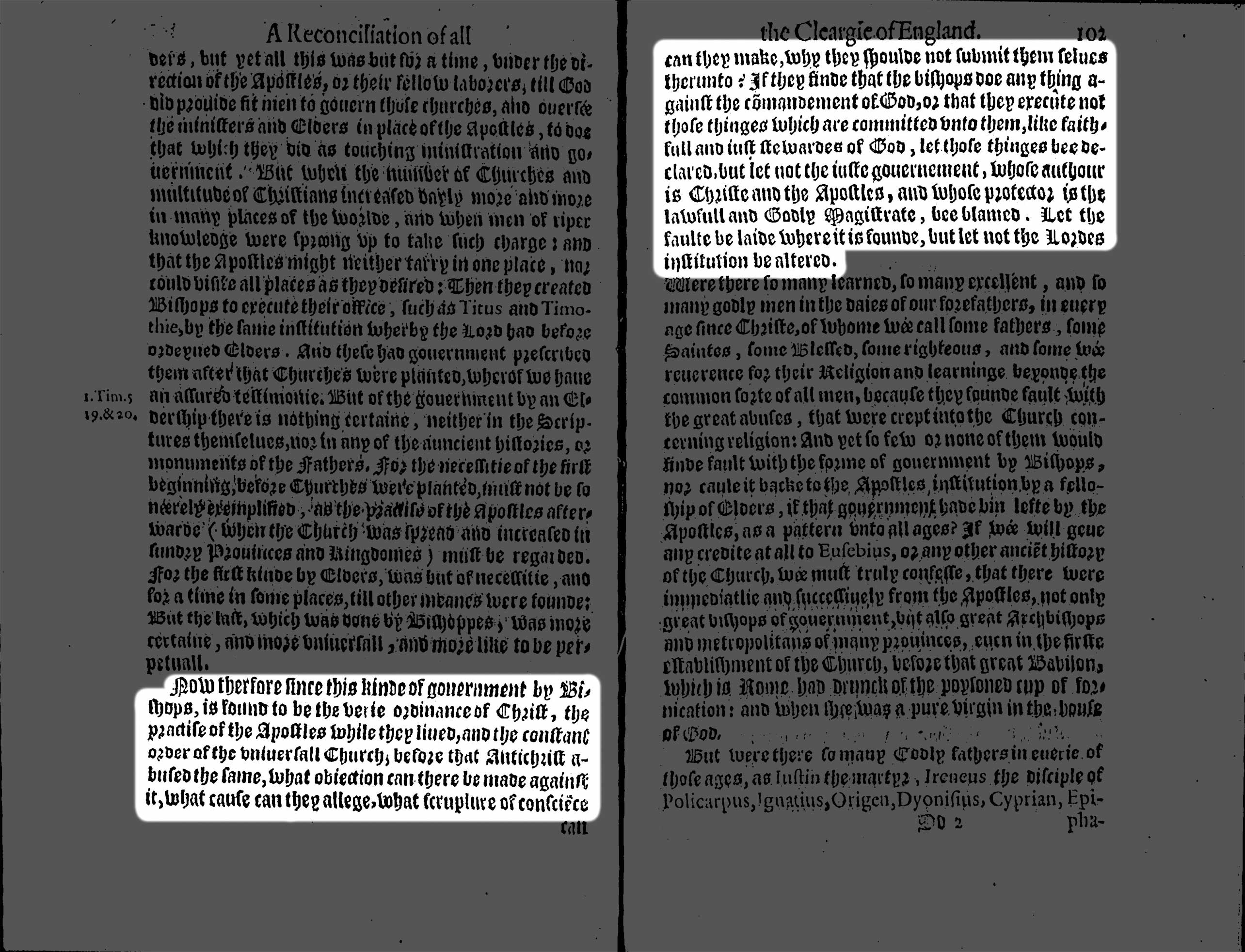
“The Laments of the Church.”
“Querimonia Ecclesiae.”
London, 1592. A. D.
p.29: “The nerves of the most perfect discipline of the Church are cut by those who scorn the ecclesiastical laws, and institute private conventicles; those who inveigh publicly against the Fasts of the church; those who shamelessly violate that episcopal authority which has often provided for my salvation.”
p.81: “Even if our lord Christ has not prescribed every particle of church discipline, he nevertheless laid down common principles, which are required to always be observed in the government of the Church” … “Manifest and grave are the sins of our so-called reformers, in disregarding the will of their Mother, and assaulting her authority.”
p.83: “All the things which the Church of God observes, and Christian societies perpetually keep, is not possible to violate without committing utmost wickedness.” “… the Church of God observes all of the paths that were instituted by the apostles themselves, or their followers: and Christian societies perpetually maintain and everywhere religiously hold fast to them. For in that which the apostles approved there can be no evil; can anyone fear danger in their ways, if he has examined the steps trod by the most pious and celebrated men of all times? All these paths have been ever an aid to the Church; who has ever tried to destroy them? By these paths of the church I mean the 40-day Lenten fast, testified to be instituted by the apostles from Jerome? Or the keeping of church feasts, which in the memory of the benefits we received from Christ, we celebrate throughout the year; which custom likewise came from the apostles, as proved by Augustine? How about the sacred distinctions among the ecclesiastical offices, being consecrated to differing and unequal honor as well as authority? The ranks of the archbishops, metropolitans, and patriarchs, which the history of deepest antiquity declares to have come from the Apostolic era, and endured as a light of the ages even to this day? All these it is not possible to subvert without danger to the church, which logic as well as logic’s helper — experience — confirms in most certain undoubtable ways.”
p.29: “Optimae illi disciplinae resciderunt neruos: qui leges ecclesiasticas venustatis, & conuenientiae causa institutas: qui indicta publice ab ecclesia Jeiunia: qui eam, quae saepe mihi salutem attulit, episcopalem authoritatem improbè violarunt.”
p.81: “Si princeps ille noster Christus, etiamsi non omnes disciplinae partes praescripsit: communes tamen proposuit regulas, quas in regenda Ecclesia semper intueri oportet” … “Graviter certe peccarent nostri reformatores, si matris tantum voluntatem negligerent, & authoritatem oppugnarent.”
p.83: “Quae tota observat dei ecclesia, & perpetuo pro sunt Christianae societati, sine maximo scelere violari non possunt.” “… ita quae tota obseruat dei ecclesia: & instituta sunt ab apostolis, vel apostolicis viris: & perpetuò prosunt Christianae societati, religiosè vbi{que} retinenda iudico. In eo enim, quod approbarunt apostoli, nihil mali continetur: quis periculum in ea via metuet, quam omnium piorum vestigijs tritam, & celebratam perspicit? & quod perpetuò ecclesiae vtilitatem afferet: quis id vnquam rescindendum putabit? In hoc rerum genere comprehēdi existimo ieiunium quadragesimae, quod ab apostolis fuisse institutum locuples author Hieronimus affirmat: & dierum etiam illorum obseruationem, quos in memoriam beneficiorum, quae à Christo accepimus, quotannis celebramus: quem morem ab apostolis similiter dimanasse, Augustinus dicit: & praeterea ecclesiasticorum officiorum distinctiones: dispares inter eos qui sacris sunt deuoti, tum honoris, tum authoritatis gradus: & archiepiscoporum, metropolitarum, at{que} patriarcharum munera, quae, vt ab apostolorum aetate, in hanc vsque diem permansisse lux temporum, & nuncia vetustatis historia declarat: ita non sine ecclesiae pernicie labefactari posse, & ratio, & rationis confirmatrix ipsa experientia certissimè ostendit.”
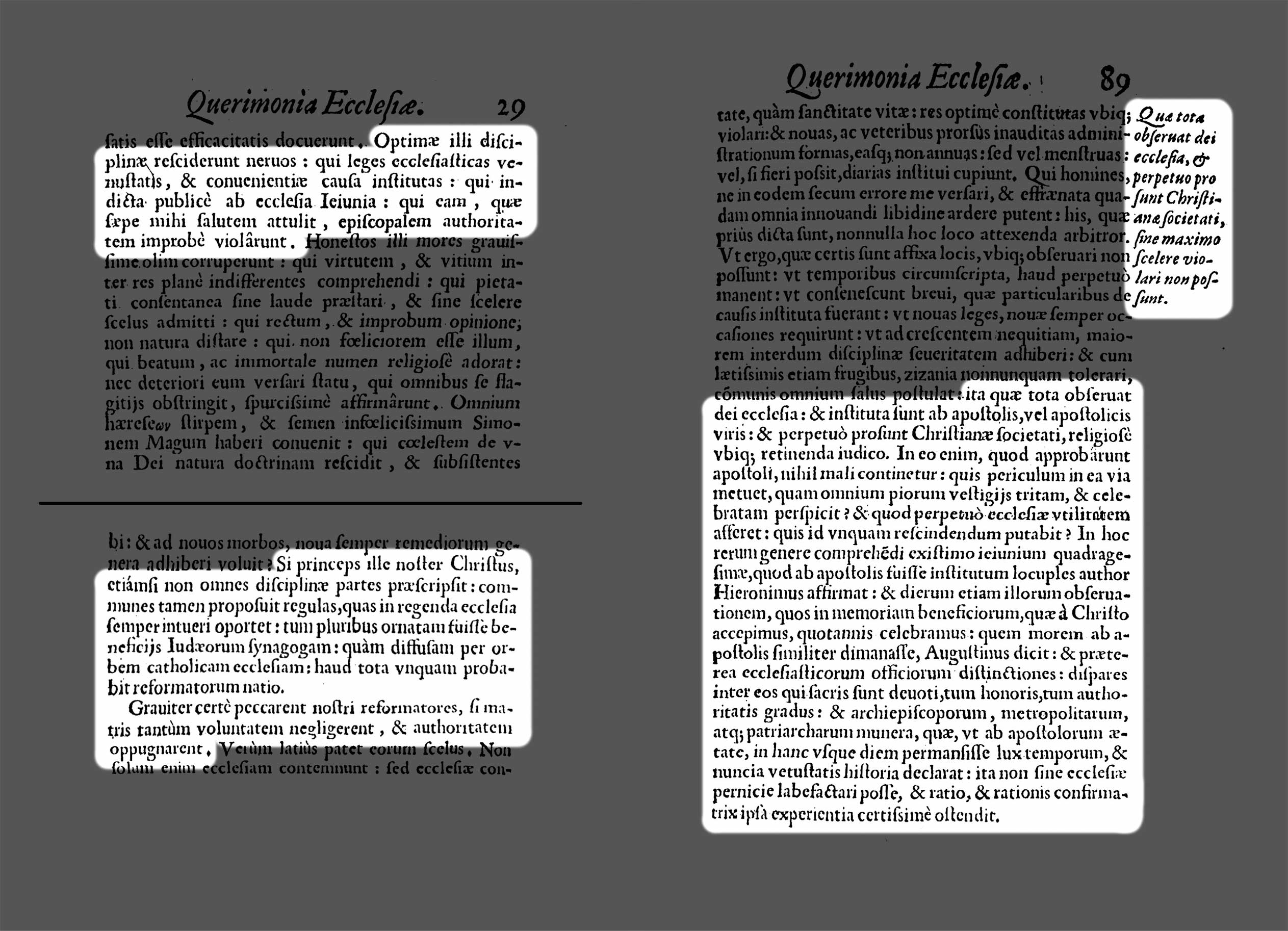
-Source: Querimonia Ecclesiae (London, 1592); page 1, page 2, page 3. Cover page.
Adam Hill.
The Defence of the Article: Christ descended into Hell.
1592. A. D.
“… today the judgment of boys is more esteemed than of reverend Fathers, and every singular schismatic is more esteemed, than a whole Synod of chosen and expert men in divinity. Hereof it cometh to pass, that whatsoever hath been most gladly and learnedly proved by M. Nowell, and approved by our convocations, is accounted error: and whatsoever every fantastical spirit doth utter without study rashly, and without fear of God presumptuously, is accounted truth, as though it had been merely revealed unto them from heaven.”
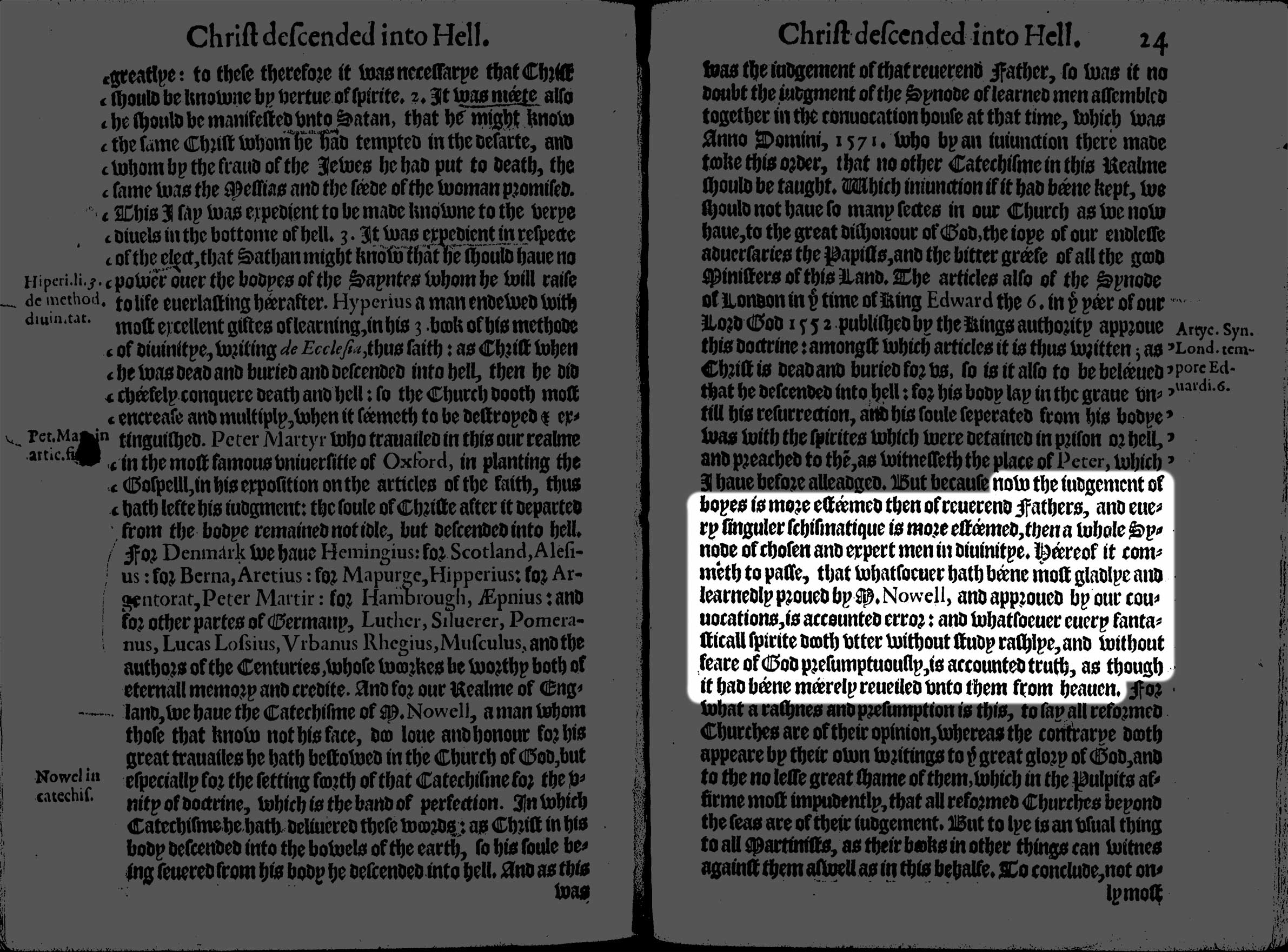
Thomas Bilson
The Perpetual Government of Christ’s Church; or the fatherly superiority established by Christ.
1593. A. D.
“… since an end of controversies must be had amongst men, lest perpetual contention bring final confusion, and pluck up the very roots of all charity and equity from amongst men, when neither private persuasion, nor friendly mediation can appease the parties contending; what other order could be prescribed, but a Judicial hearing and determining of things in question?”
“Since we find no single nor supreme Judge, on whom the Church of Christ must always depend for the debating and ending of ecclesiastical strifes and contentions; of necessity there must either be none, which were the utter subversion of all peace and order amongst the faithful, where there wanteth a Christian Magistrate; or else the Pastours and Stewards of Christ’s Church, to whom the care and charge thereof is committed, must assemble together, and with mutual conference and consent, perform those duties to the Church in general, which otherwise they do to each particular place and person.”
“The Church is the body of Christ, and in that respect, as in our bodies, so in His, not only the members have a common care for the whole, but the principal parts must direct and guide the rest; namely, the eyes to see, the ears to hear, and the mouth to speak for the whole body. Such, therefore, as Christ hath placed to be the watchmen and leaders, the light and salt of His Church, must not only warn and guide, but also Lighten and Season in their measure the whole body; for what commission they have from Christ, severed and single in their proper charges, the same they must needs retain assembled and joined throughout their circuits. Yea, the Lord so much tendereth the fatherly care and brotherly concord of the pastors of his Church, that He hath promised to be ‘present in the midst’ of their assemblies, and with His Spirit to direct them, so they come together, not to accomplish their own lusts and desires, but to sanctify His name by detecting error, resisting wolves, maintaining truth, curing the sores and maladies that fester and poison the members of His body. . . . . This course the Apostles taught the Church of Christ to follow by their example when about the question that troubled the Church of Antioch, the Apostles and Elders came together to examine the matter, and to verify their Master’s words to be true; not only the Apostles, but the whole assembly wrote thus in their letters: — ‘It seemeth good to the Holy Ghost and to us.’ For it be sure what the Apostle said, ‘the Holy Ghost made you overseers to feed the Church’; and if our Saviour could not be received when He said, ‘He that heareth you heareth Me’, this must be verified as well of pastors assembled as singled; yea, pastors gathered together in Christ’s name, are rather assured of His direction and assistance, than when they be severed, unless there be any that thinketh that God inspireth one particular person with righteousness, and forsaketh a number of priests assembled in synod, which the Council of Africa reputeth to be very absurd, and repugnant to Christ’s promise, so long as they meet together in His name, and not to deface His truth, or oppress their brethren. This hath in all ages, as well before as since the great Council of Nice, been approved and practiced as the lawfullest and surest means to discern truth from falsehood, to decide doubts and strifes, and redress wrongs in causes ecclesiastical; yea, when there was no believing magistrates to assist the Church, this was the only way to cleanse the House of God, as much as might be, from the loathsome vessels of dishonour; and after Christian princes began to profess and protest the truth, they never had, nor can have, any better or surer direction amongst men, than by the synods of wise and godly pastors.”
“There is no Christian Realm nor Age, wherein the use of Synods hath not been thought needful, as well under believing magistrates for consultation and direction, as under Infidels for the stopping of irreligious opinions, withstanding wicked enterprises, and procuring the peace and holiness of the Church, as appeareth by the Councils that have been kept in all kingdoms and countries since the Apostles times, when any matter of moment came in question, which are extant to this day; and likewise by the Synods that every Nation and Province did yearly celebrate according to the rules of the great Nicene and Chalcedon Councils, which can not be numbered, and were not recorded.”
“And unless you give the Pastor and Presbyters of every parish full and free power to profess what religion they best like, to offer what wrongs they will, to use what impiety and tyranny they themselves list, without any restraint or redress, which were an heathenish, if not an hellish confusion; you must where there is no christian magistrate, (as oftentimes in the Church of Christ there hath been, and may be none) yield that liberty to the Church of Christ, which every human society hath by the principles of nature; to wit, that the whole may guide each part, and the greater number over-rule the lesser, which without assembling in Synod cannot be done.”
“when the Magistrate doth not regard but rather afflict the Church, as in times of infidelity and heresy, who shall then assemble the Pastours of any province to deliberate and determine matters of doubt or danger? Shall error and injury overwhelm the church of God without any public remonstrance or refusance? In questions of faith, cases of doubt, matters of faction, offers of wrong, breach of all order and equity, shall each place and Presbytery be free to teach and do what they please, without depending on, or so much as conferring with the rest of their brethren? Call you that the discipline of Christ’s Church, and not rather the dissolution of all peace, and subversion of all truth in the house of God? I think you be not so far besides yourselves, that you strive for this pestilent kind of anarchy to be brought into the world. Our age is giddy enough without this frenzy to put them forward. Howbeit we seek not what new course you can devise after fifteen hundred years to govern the Church: but what means the ancient and Primitive Church of Christ had, before Princes embraced the truth, to assemble Synods, and pacify controversies as well touching religion as Ecclesiastical regiment, and if in the Church histories you find any other besides Metropolitans, that called and governed Provincial Councils, name the men, and note the places, and we yield you the prize.”
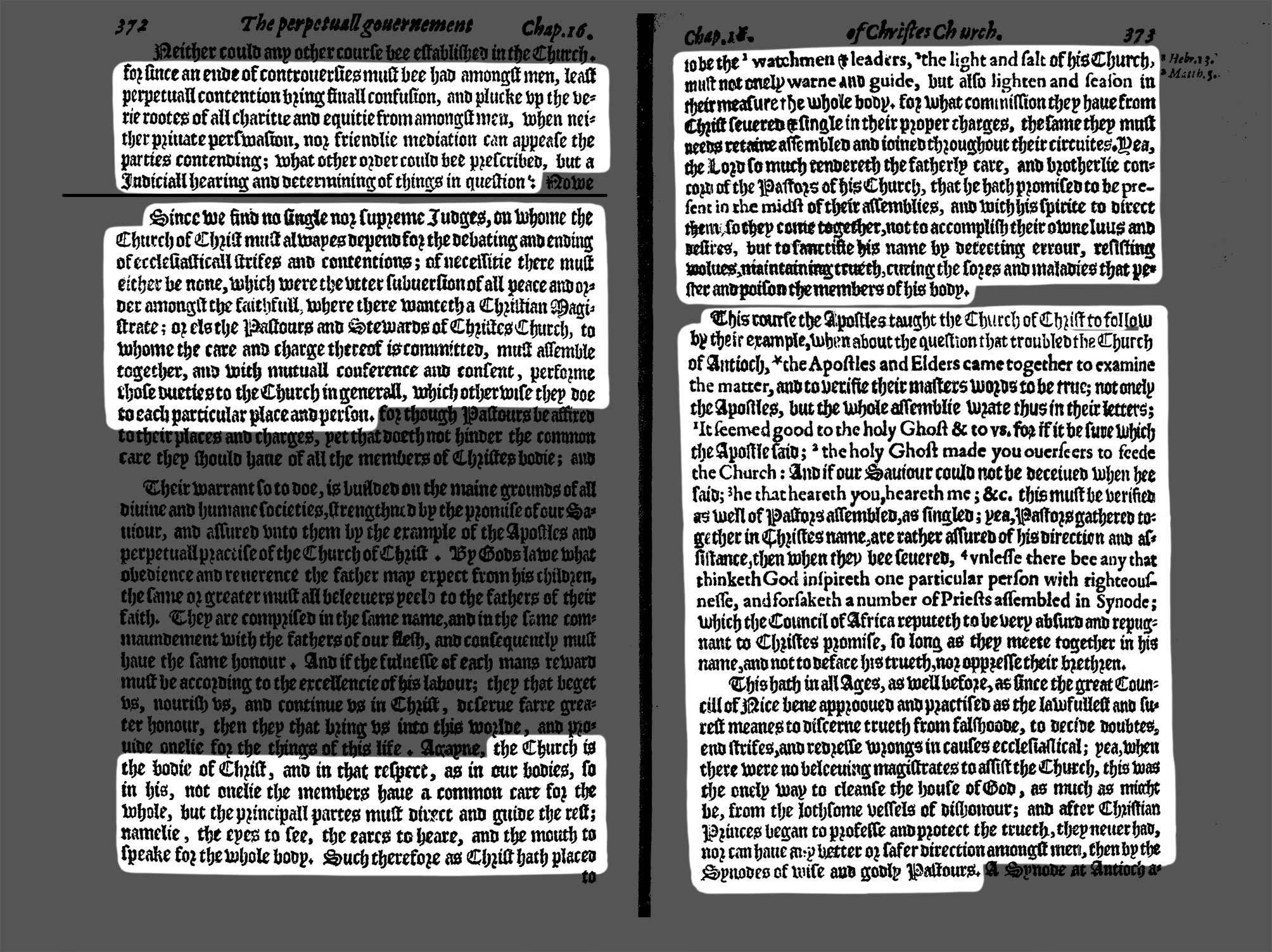
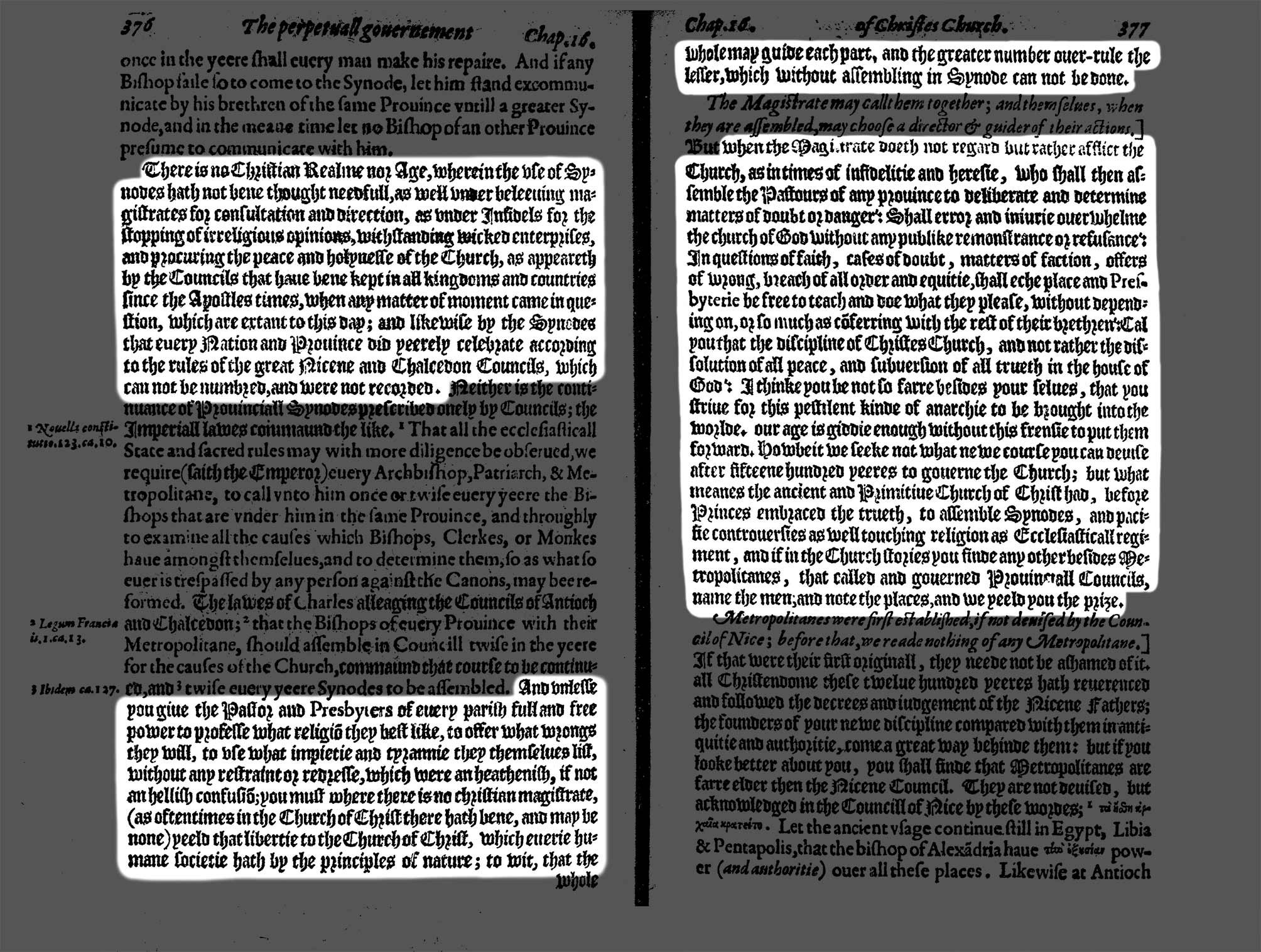
-Source: Thomas Bilson, The Perpetual Government of Christ’s Church; Wherein are handled the fatherly superioritie which God first established in the patriarkes for the guiding of his Church, and after continued in the tribe of Leui and the prophetes; and lastlie confirmed in the New Testament to the Apostles and their successours (1593); cover page.
Richard Hooker.
The Laws of Ecclesiastical Polity. Book V.
1597. A. D.
Ch. 8. “The Church hath authority to establish that for an order at one time, which at another time it may abolish, and in both do well. But that which in doctrine the Church doth now deliver rightly as a truth, no man will say that it may hereafter recall, and as rightly avouch the contrary. Laws touching matter of order are changeable, by the power of the Church; articles concerning doctrine not so. We read often in the writings of catholic and holy men touching matters of doctrine, this we believe, this we hold, this the Prophets and Evangelists have declared, this the Apostles have delivered, this Martyrs have sealed with their blood, and confessed in the midst of torments, to this we cleave as to the anchor of our souls, against this, though an Angel from heaven should preach unto us, we would not believe.”
“The bare consent of the whole Church should itself in these things stop their mouths, who living under it, dare presume to bark against it. “There is (saith Cassianus) no place of audience left for them, by whom obedience is not yielded to that which all have agreed upon.” Might we not think it more than wonderful, that nature should in all communities appoint a predominant judgment to sway and overrule in so many things; or that God himself should allow so much authority and power unto every poor family for the ordering of all which are in it; and the city of the living God, which is his Church, be able neither to command nor yet to forbid any thing, which the meanest shall in that respect, and for her sole authority’s sake, be bound to obey?”
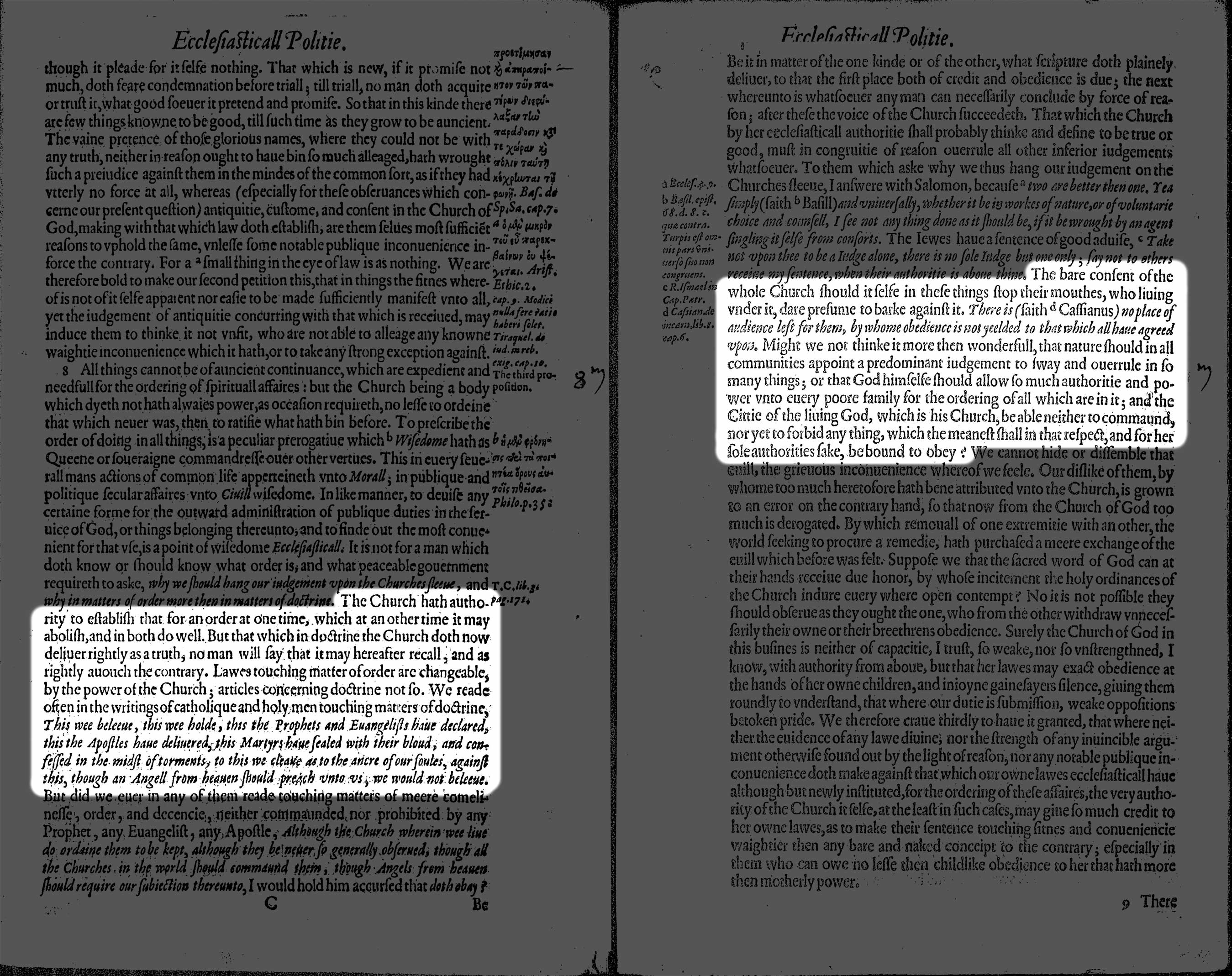
The 1598 Convocation.
“Ecclesiastical Constitutions held by the Archbishop, Bishops, and the clergy of the Province of Canterbury at the Synod held in London.”
[Official document]
1598. A. D.
“Chapters or ecclesiastical constitutions held by the archbishop, bishops, and the clergy of the province of Canterbury, at the synod held in London, 1598.”
(latin) “Capitula sive constitutiones ecclesiasticae per archiepiscopum, episcopos, & reliquum clerum Cantuariensis prouinciae in synodo inchoata Londini, 1598.”
“The Orders of marital separation shall not be frivolously carried out.”
(latin) “De Sententiis divortii non temere ferendis.”
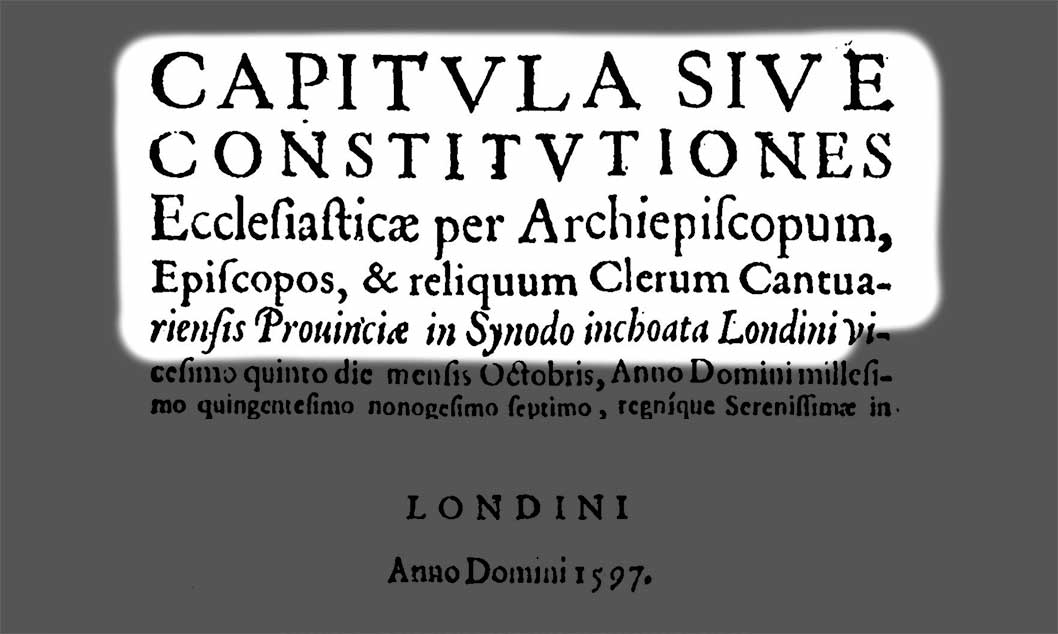
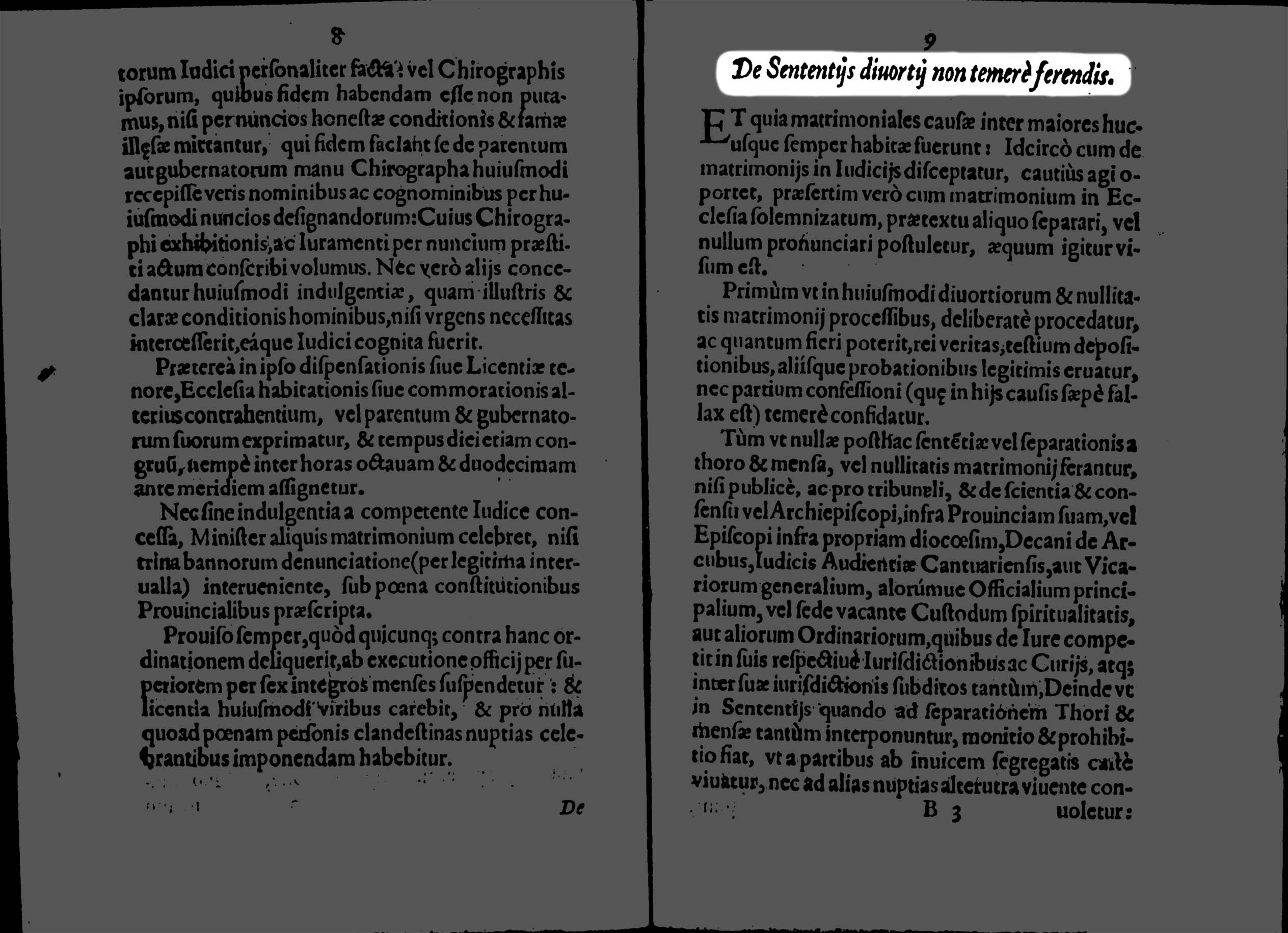
The 1604 Convocation.
Constitutions and canons ecclesiastical treated upon by the convocation the province of Canterbury.
[Official document]
1604. A. D.
Canon CXXXIX: “Whosoever shall hereafter affirm, that the sacred Synod of this nation, in the name of Christ, and by the King’s authority assembled, is not the true Church of England by representation; let him be Excommunicated, and not restored, until he repent and publicly revoke that his wicked Error.”
Canon CXL: “Whosoever shall affirm, that no manner of person, either of the Clergy or Laity, nor being themselves particularly assembled in the said sacred Synod, are to be subject to the decrees thereof in causes ecclesiastical, (made and ratified by the King’s Majesty’s supreme authority,) as not having voices in them; let him be Excommunicated, and not restored until he repent and publicly revoke that his wicked Error.”
Canon V: “Whosoever shall hereafter affirm, That any of the Thirty Nine Articles agreed upon by the Archbishops, and Bishops … are in any part Superstitious or Erroneous, or such as he may not with a good Conscience subscribe unto: Let him be Excommunicated ipso facto, and not restored but only by the Archbishop, after his Repentance and public Revocation of such his wicked Errors.”
Canon LVII: “We do require and Charge everyone seduced by false Teachers to reform that their Willfulness, and to submit to the Order of the Church …”
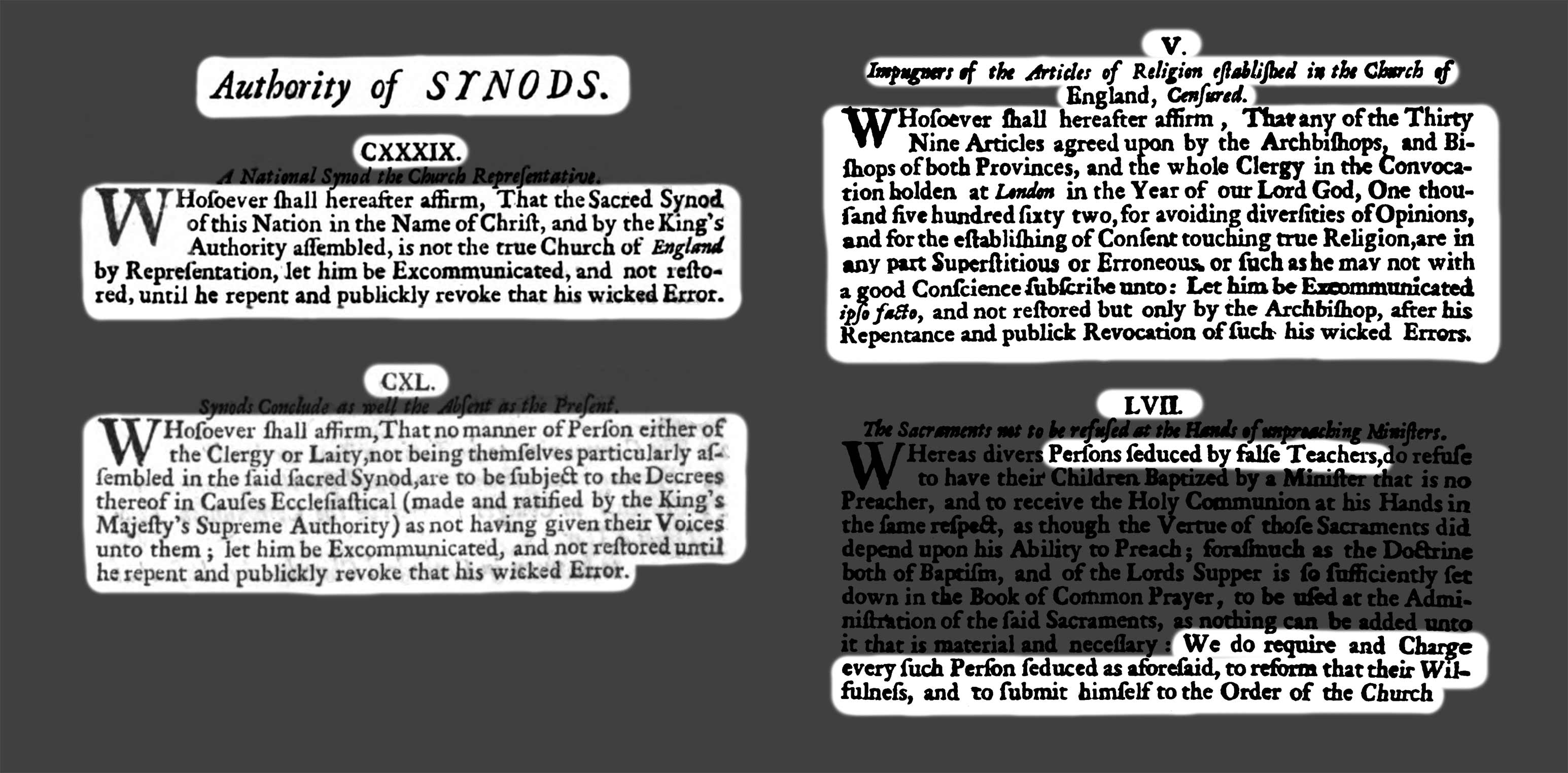
-Source: Constitutions and canons ecclesiastical treated upon by the Bishop of London, president of the convocation for the province of Canterbury, and the rest of the bishops and clergy of the said province: and agreed upon with the Kings Majesties licence in their synod begun at London, anno Dom. 1603 (1604); cover page.
The 1606 Convocation.
1606. A. D.
Book II. Canon VII. “And therefore if any Man shall affirm, under colour of any thing that is in the Scriptures, … that it was an idle course held by the Primitive Churches, and ancient Fathers, to keep the Catalogues of their Bishops, or to ground Arguments in some Cases upon their Succession, in that they were able to deduce their beginnings, either from the Apostles, or from some Apostolical Persons; … or that any since the Apostles times, till of late days, was ever held to be a lawful Minister of the Word and Sacraments, who was not Ordain’d Priest or Minister, by the Imposition of the hands of some Bishop; … or, that the Apostles, and all the ancient Fathers, were deceived, when they judged the Authority of Bishops necessary at all times for the suppressing of Schisms; and that without Bishops, there would be in the Churches as many Sects as Ministers; … or, that it doth proceed from any other than the wicked Spirit, for any sort of Men, what godly shew soever they can pretend to seek to discredit (as much as in them lieth) that Form of Church-Government, which was established by the Apostles, and left by them to continue in the Church to the end of the World, under Archbishops and Bishops; … He doth greatly Err.”
Book I. Canon I. “If any Man therefore shall affirm with any Pagan, Heretick, Atheist …; he doth greatly Err.”
Book I. Canon II. “If any Man shall therefore affirm, that …; he doth greatly Err.”
Book I. Canon III. “If any Man therefore shall affirm, that …; he doth greatly Err.”
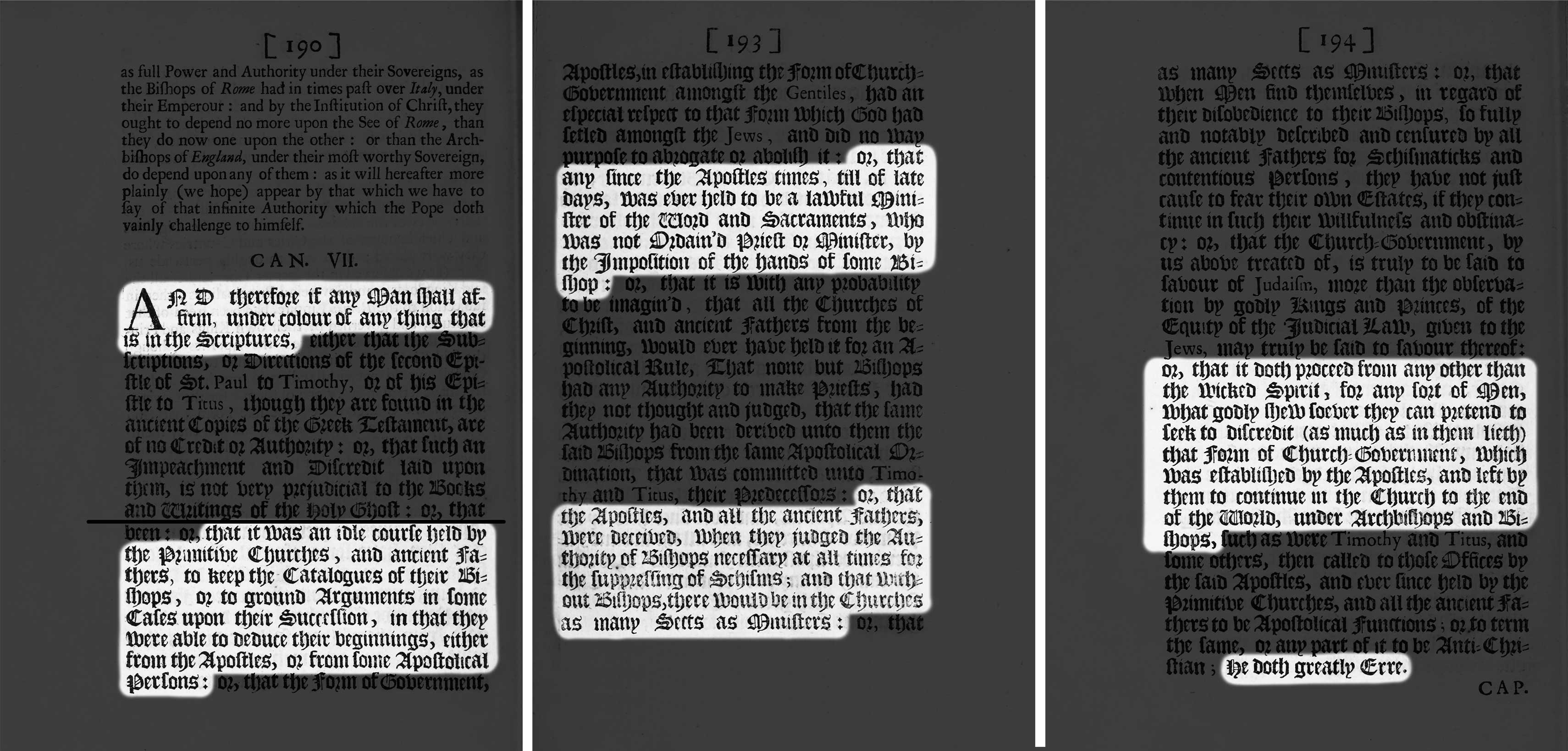
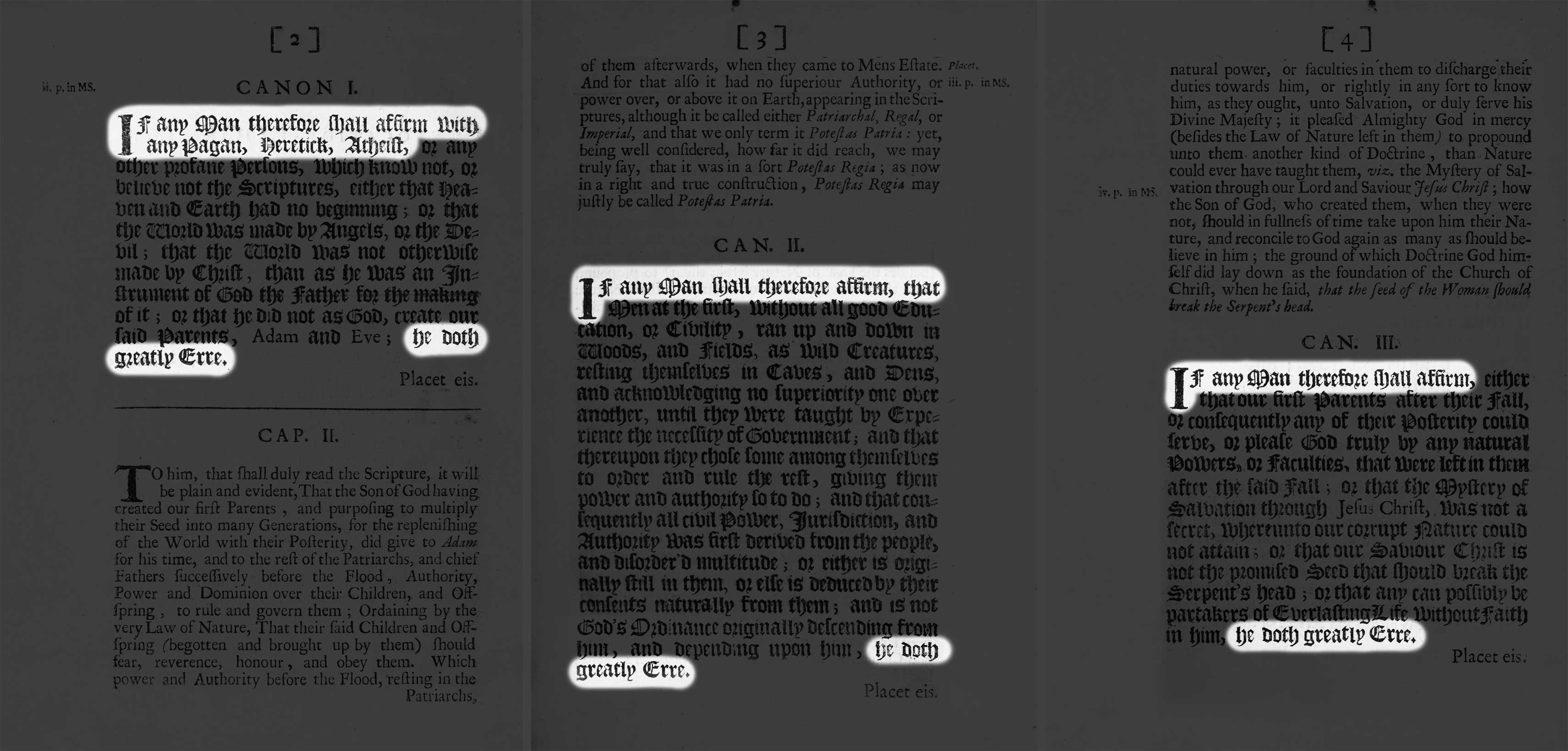
-Source: “1606 Convocation book MDCVI, concerning the government of God’s Catholick church, and the kingdoms of the whole world (1690); page 1, page 2, page 3, page 4.
John Overall.
An epistle to Hugo Grotius.
September 25, 1617. A. D.
“Our divines hold, that the right to definitive judgment in matters of faith, is to be given to synods of bishops and other learned ministers of the Church, chosen and convened for this purpose, according to the usage of the ancient Church: who shall determine from the Holy Scriptures according to the consent of the ancient Church; and not according to the private thoughts of any New thinkers.”
(latin) “Tenent enim nostri, judicium de rebus fidei definiendi, Synodis Episcoporum aliorumque doctorum ministrorum Ecclesiae, ad hoc delectorum & convocatorum, deferendum esse secundum consuetudinem veteris Ecclesiae, ex Sacris Literis, per consensum veteris Ecclesiae, non privatum spiritum Neotericorum explicatis, terminandum.”
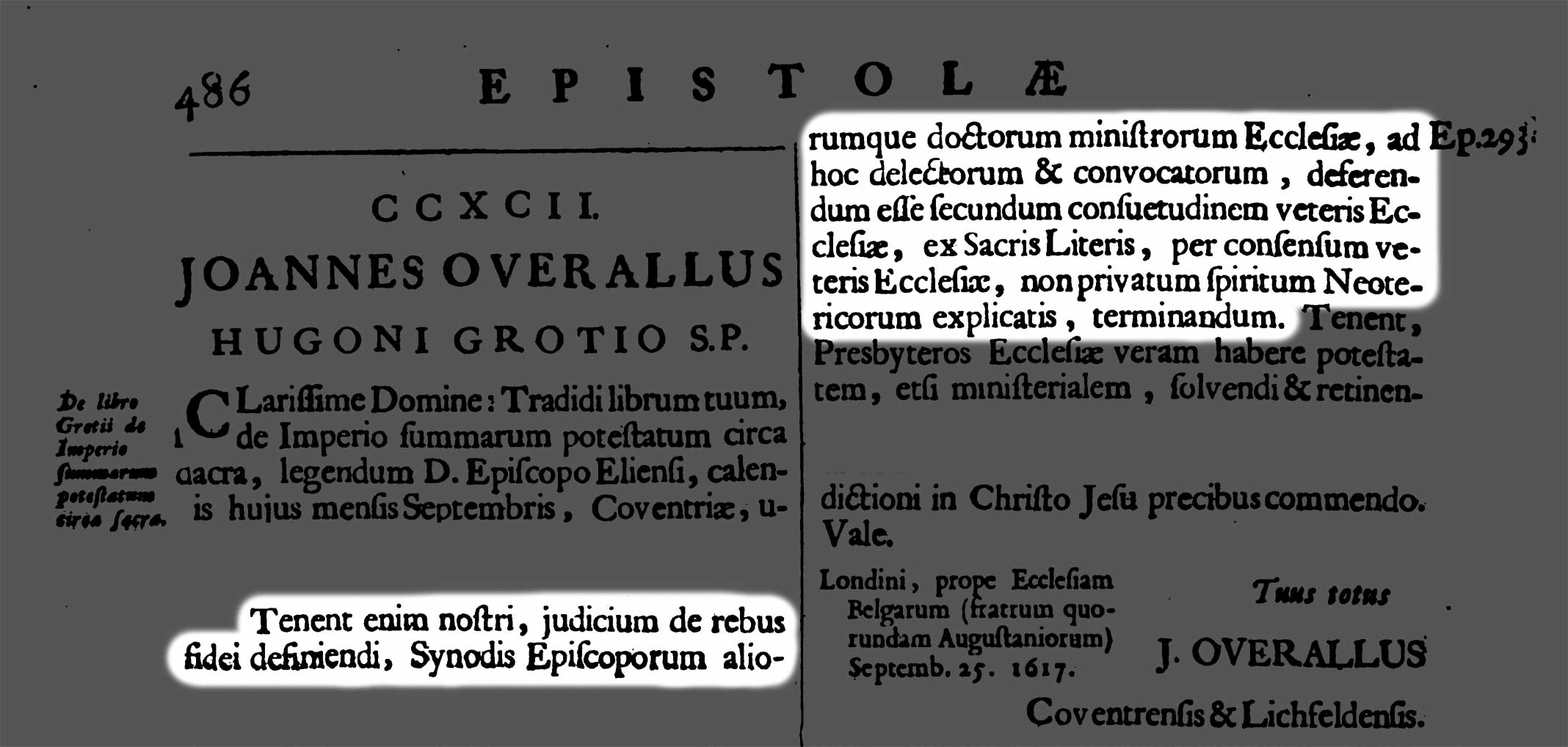
John Potter.
The Oration to the Holy Synod of the Province of Canterbury.
1741. A. D.
“The Oration to the Holy Synod of the Province of Canterbury, held Dec. 10, 1741”
(latin) “Oratio ad. S. Synodum Provinciae Cantuarensis habita Dec. 10. 1741.”
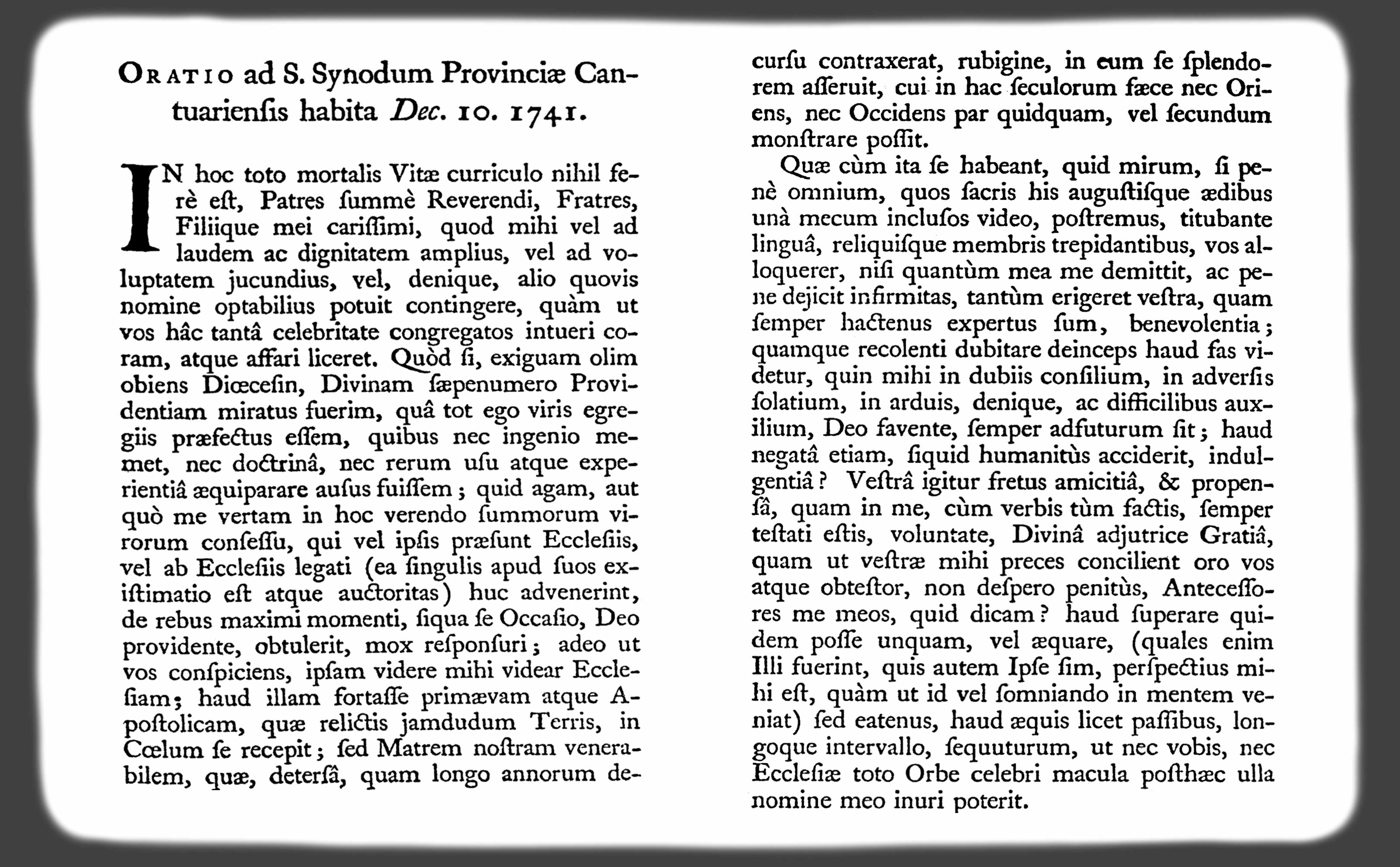
Interpretation.
A declaration of doctrine.
May, 1559. A. D.
“… at no time hath the Subtle Serpent been more strong in his Wicked Members, and Deceitful Workers, to deface the Doctrine of the Gospel, and to slander the Setters forth of the same, than he hath shewed himself at this Time: […] most untruly reporting of us, that […] we dissent among our selves; and that every Man nourishes and maintains his Personal Opinion”

-Source: “A Declaration of Doctrine” (1559), in John Strype, Annals of the Reformation, ch. viii (1709), p.114; full page. Google Books.
The Articles of Religion.
[Official document]
1563. A. D.
Article 20, Of the Authority of the Church. “… the Church be a witness, and a keeper of holy writ.”
“The Church hath power to interpret, and expound the word of God.”
Articulum XX. De Ecclesiae autoritate. “… Ecclesia sit divinorum librorum testis & conservatrix”

-Source (latin): Articuli de quibus in synodo Londinensi anno Domini iuxta ecclesiae Anglicanae computationem M.D.LXII ad tollendam opinionum dissensionem & firmandum in uera religione consensum (1563); full page.
Alexander Nowell.
“The Large Catechism”, A catechism, or first instruction and learning of Christian religion.
[Official document]
1570. A. D.
Master: “Dost thou then affirm that all things necessary to godliness and salvation are contained in the written Word of God?”
Student: “Yea; for it were a point of intolerable ungodliness and madness to think, either that God hath left an imperfect doctrine, or that man were able to make that perfect which God left imperfect. Therefore the Lord hath most straitly forbidden men, that they neither add any thing to, nor take any thing from, His Word, nor turn any way from it, either to the right hand or to the left.”
Master: “If this be true that you sayest, to what purpose then are so many things so oft in councils, ecclesiastical assemblies, decreed, and by learned men taught in preaching, or left in writing?”
Student: “All these things serve either to expounding of dark places in the Word of God, and to take away controversies that arise among men, or to the orderly stablishing of the outward governance of the Church, and not to make new articles of religion.”
Master: “Dost thou then think that we are bound to hear such teachers and expounders?”
Student: “Even as the Lord himself if he were present, so far as they teach only those things which they have received of the Lord. Which himself witnesseth, saying, he that heareth you heareth me, he that despiseth you despiseth me. Yea and moreover to these preachers of his word he hath given the power to bind and loose, that whose sins soever they by the word of God shall pardon or detain on earth, the same shall be pardoned or detained in heaven.”

The 1571 Convocation.
“For the passing of Articles of Religion.”
[Official document]
1571. A. D.
“… a committee was appointed which drew up certain Articles, which were really those of the Convocation of 1562, with, however, certain omissions. The archbishop [Matthew Parker] asked why they had left out [the Articles] for the consecration of bishops and others relating to the hierarchy; Peter Wentworth replied they had done so because they had not yet made up their minds as to whether they were agreeable to the Word of God or not. ‘But surely,’ said the archbishop, ‘in these things you will refer yourselves wholly to us, the bishops.’ ”
“I was amongst others the last parliament sent unto [Matthew Parker] the bishop of Canterbury for the Articles of Religion that then passed this House of Commons. He asked us why we [took] out of the book the Articles for the Homilies, consecrating of Bishops, and suchlike. ‘Surely, sir’, said I, ‘because we were so occupied in other matters that we had no time to examine them how they agreed with the word of God.’ ‘What!’ said he, ‘surely you mistook the matter. You will refer yourselves wholly to us therein.’ ”
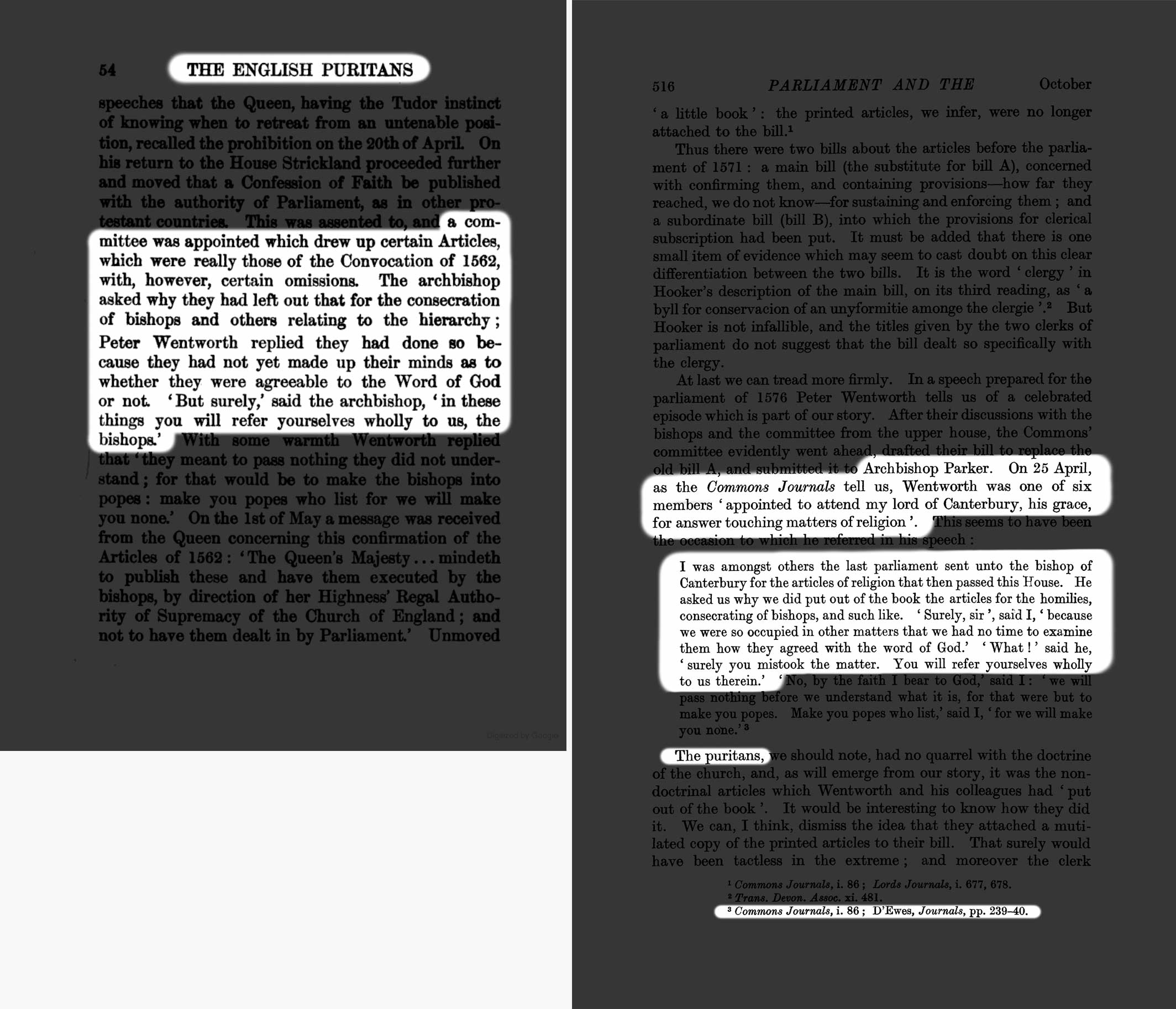
-Source for page 1: John Brown, The English Puritans (1911); cover page. Online: Archive.org
Thomas Rogers.
The English Creed.
1579 / 1607. A. D.
Proposition: “The Church hath power to interpret, and expound the word of God. To interpret the word of God is a peculiar blessing, given by God only to the Church”
“The errors, and Adversaries unto this truth. Many, & sundry are the adversaries unto this truth. Some think that to expound the word of God is so easy a matter, as any Student, endued with a good natural wit, by diligence and industry of his own, may do the same.”
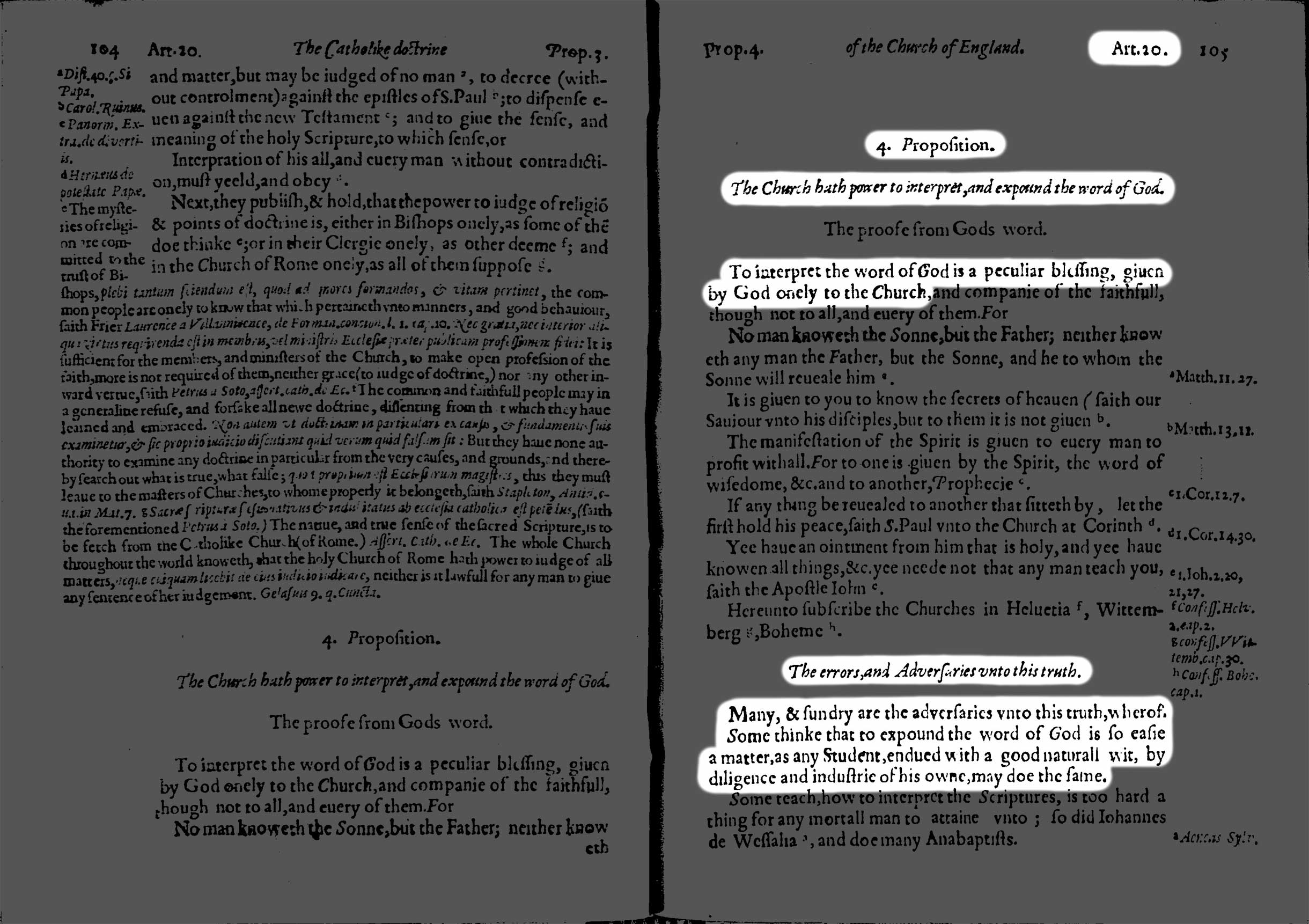
-Source: Thomas Rogers, English creede consenting vvith the true, auncient, catholique, and apostolique Church (1579); cover page.
John Whitgift.
“Three Articles” touching Preachers and Other Orders for the Church.
[Official document]
October, 1583. A. D.
Article 5: “That none be permitted to preach, or interpret the Scriptures, unless he be a priest, or deacon at the least, admitted thereunto according to the laws of this realm.”
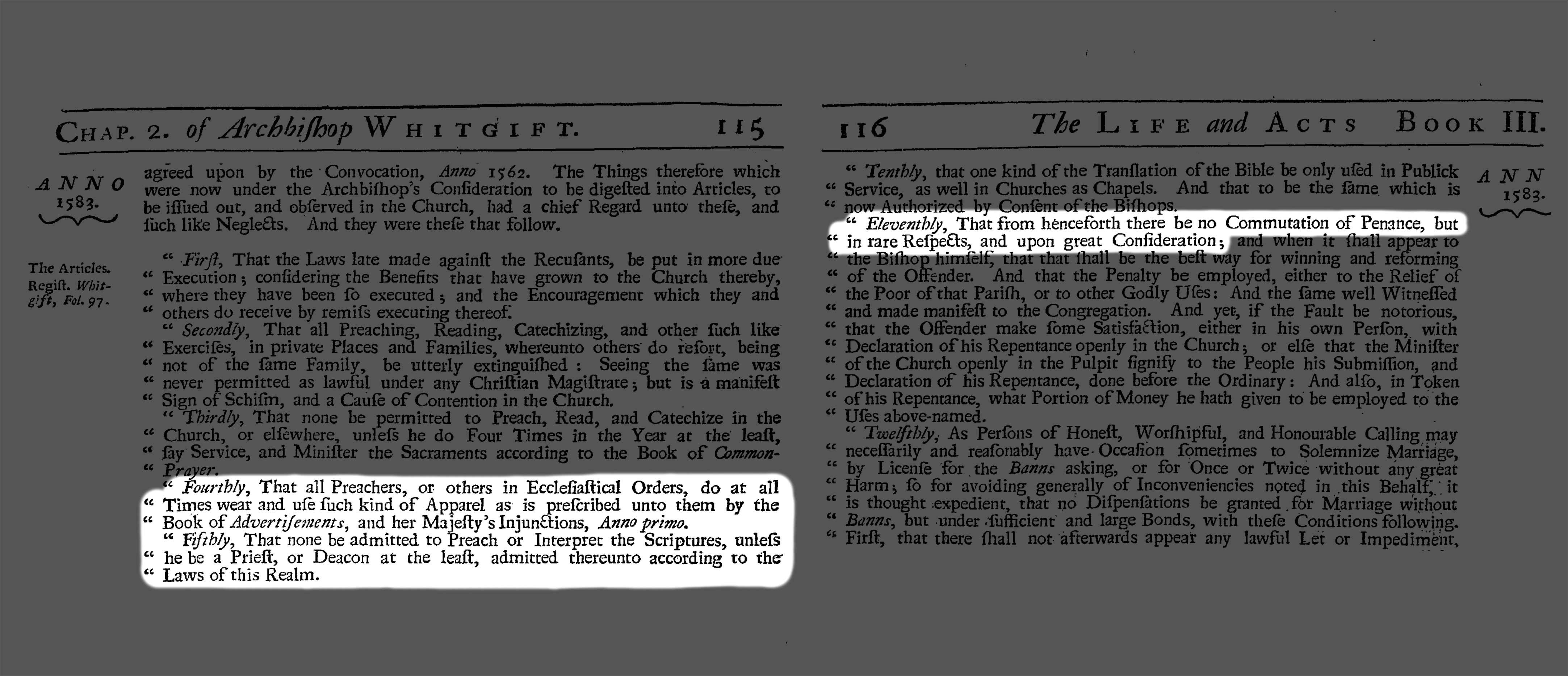
Richard Bancroft.
A Sermon on 1 John iv. 1, Preached at Paul’s Cross.
1588. A. D.
“Read the Scriptures, but with sobriety. If any man presuming upon his knowledge, seek farther than is meet for him, besides that he knoweth nothing as he ought to know, he shall cast himself into a labyrinth and never find what he seeketh for. God hath bound himself by his promise unto his church, of purpose that men, by her good direction, might in this point be relieved. To whose godly determination in matters of question, her dutiful children ought to submit themselves without any curious or willful contradiction. I could bring many authorities to this effect. Those things (saith Athanasius) which have been proved and decreed by so many and so worthy Bishops, Supervacaneum est denuo in judicium revocare: it is in vain to call again into question.”
“When certain men in the council of Chalcedon began to dispute of some points determined before by the council of Nice, the fathers there assembled said all with one voice: Si quis retractat, anathema sit; si quis super ista inquirit, anathema sit; maledictus qui addit; maledictus qui aufert; maledictus qui innovat; If any retract, accursed be he; if any inquire of these things, accursed be he; accursed be he that addeth; accursed be he that diminisheth; accursed be he that innovateth.”
“The Emperors Valentinian and Martian thought it very unmeet that those things which had been once judged of, and well decided by the decrees of godly synods, should again be debated and disputed upon; and both they and divers others made very godly laws for the better containing of busy heads within the compass of this christian modesty. And surely it is a very true doctrine, that when councils and synods, being lawfully assembled and directed with God’s spirit, do resolve upon matters in question, that private men should content themselves therewith.”
“But touching Ecclesiastical persons it was commanded about 1270. years ago, that certain men, having by schism and heresy divided themselves from the church of God, and rent asunder by their factions the peace thereof, should not again be received or admitted before they had subscribed to the constitutions of the church. Thus the words stand in the eight canon of the council of Nicea. Ante omnia hanc habeant ab iis confessionem, quam per scripturam exigi oportet, ut fateantur se cum omni consensu, ecclesiae Catholicae statuta observaturos:
Let them first take of them this confession, and that under their hand-writing, that they promise with all consent, to observe the statutes of the catholike church.”
“Whereas therefore we have at this time many amongst us […] searching and trying to make new quarrels of matters before compounded, you see what spirits they are, and need no farther trial to discern them. God grant unto them more humble and sober minds, that they may no longer continue in this rebellion against the church of God.”


-Source: A sermon preached at Paules Crosse the 9. of Februarie being the first Sunday in the Parleament, Anno. 1588. by Richard Bancroft D. of Divinitie, and chaplaine to the right honorable Sir Christopher Hatson Knight L. chancelor of England (1588); cover page. Images for the second plate: page 1, page 2.
Matthew Sutcliffe.
A Treatise upon Ecclesiastical Discipline, that confused form of government, brought in under false pretence and title of reformation.
1590. A. D.
“Ch. 3. sect. 4.
“1. Seeing the fathers with one consent throughout the world received the constitution of bishops, that it came from the spirit of God by the ministry of the Apostles: for it is not the power of man, that on a sudden can move men’s hearts generally to receive one order established, but the effectual work of God’s spirit… I believe that those things that were by godly fathers gathered in Gods name, and consenting together, defined & received, that they were also from ye holy Ghost, although not of like authority with scriptures”
“2. Seeing the holy fathers say it is a divine institution; the babble of contentious fellows against such authority weighs not so much as a pepper grain against a woolsack.”
“3. That which ancient general councils, which this realm do approve, do decree, that it is not by every light fellow to be reproved; and rather doth he deserve stripes then words, that will disallow that which all general councils have allowed, not being contrary to the word of God, which of those councils cannot be presumed.”

Adam Hill.
The Defence of the Article: Christ descended into Hell.
1592. A. D.
“… today the judgment of boys is more esteemed then of reverend Fathers, and every singular schismatic is more esteemed, than a whole Synod of chosen and expert men in divinity. Hereof it cometh to pass, that whatsoever hath been most gladly and learnedly proved by M. Nowell, and approved by our convocations, is accounted error: and whatsoever every fantastical spirit doth utter without study rashly, and without fear of God presumptuously, is accounted truth, as though it had been merely revealed unto them from heaven.”

John Overall.
An epistle to Hugo Grotius.
September 25, 1617. A. D.
“Our divines hold, that the right to definitive judgment in matters of faith, is to be given to synods of bishops and other learned ministers of the Church, chosen and convened for this purpose, according to the usage of the ancient Church: who shall determine from the Holy Scriptures according to the consent of the ancient Church; and not according to the private thoughts of any New thinkers.”
(latin) “Tenent enim nostri, judicium de rebus fidei definiendi, Synodis Episcoporum aliorumque doctorum ministrorum Ecclesiae, ad hoc delectorum & convocatorum, deferendum esse secundum consuetudinem veteris Ecclesiae, ex Sacris Literis, per consensum veteris Ecclesiae, non privatum spiritum Neotericorum explicatis, terminandum.”

Letter to the Lord Bishop of Bangor.
From a Clergyman of the Church of England.
1718. A. D.
[Some people today, on] the contrary Extreme, have broken down the Fences of Order and Decency, made of the lowest of the People Stewards of the Mysteries of Christ, and committed the Preaching and Exposition of the Scriptures (from the conceit of their Plainness and Perspicuity) indifferently to all. The Church of England has always wisely pursued the Middle Way. She thinks that the Holy Scriptures are neither so dark and unintelligible, as to be with-held from her Children for fear of Danger; nor yet so plain and easy, as to be submitted to the Interpretation of every wanton Fancy: She perceives that there are Shallows wherein the youngest Lambs may wade, and Depths wherein the greatest Camels may swim; and therefore she expects, that the Ignorant should be apt to learn, and the Priests Lips to preserve Knowledge. Tho’ she lays no mighty stress upon human Learning; yet she cannot but conceive, that a competent Share thereof is no bad Assistant to a right Exposition of the Scriptures. Tho’ she makes no arrogant Claims to Infallibility; yet for Peace and Unities sake, she cannot but require the Submission of private Judgments to her mature Decisions; and tho’ she utterly disclaims the over-bearing influence of great Names, and a blind adherence to mere Authority; yet she cannot but imagine, that the Opinion of Reverend Fathers, the Decrees of general Councils, and the long Continuance of her own Laws and Canons, ought in every Dispute, to be had in some Force and Veneration amongst us. Of late there are risen up in our Church, and some of them Persons of great Renown and sacred Character (I wish we cou’d conceal it) who, under pretence of standing up for common Rights of Mankind, and destroying, what they call, a Spiritual Usurpation; are destroying, in truth, all Order and Uniformity amongst us, introducing a Babel of licentious Confusion, and endeavouring to bring you, by the false Notion of Self-sufficiency, to a settled contempt of those that are set over you in the Lord.
I think, I may be allow’d, in what I have farther to discourse upon this Text, to join these two Points together; and while I am endeavouring to magnify our Office, at the same time instruct you in your Duty, and establish you in your Affections thereunto. And this I shall do,
I. By shewing you that the Holy Scriptures, upon several Accounts, are not so plain and intelligible as is pretended, but in some Things hard to be understood.
II. That supposing they were so plain as is pretended, yet this would not lessen the Authority, nor take away the Necessity of Spiritual Guides.
III. That though the Scriptures be plain in themselves, yet private Men forsaking their Guides, and following their own Fancies, may deprave and distort them to their own Destruction. And,
IV. That for the prevention of any such Mischief, it is the Duty of private Persons to submit their Judgments in Matters of Religion to the Determination of their Spiritual Guides; so long as their Determinations are not contrary to the Word of God.
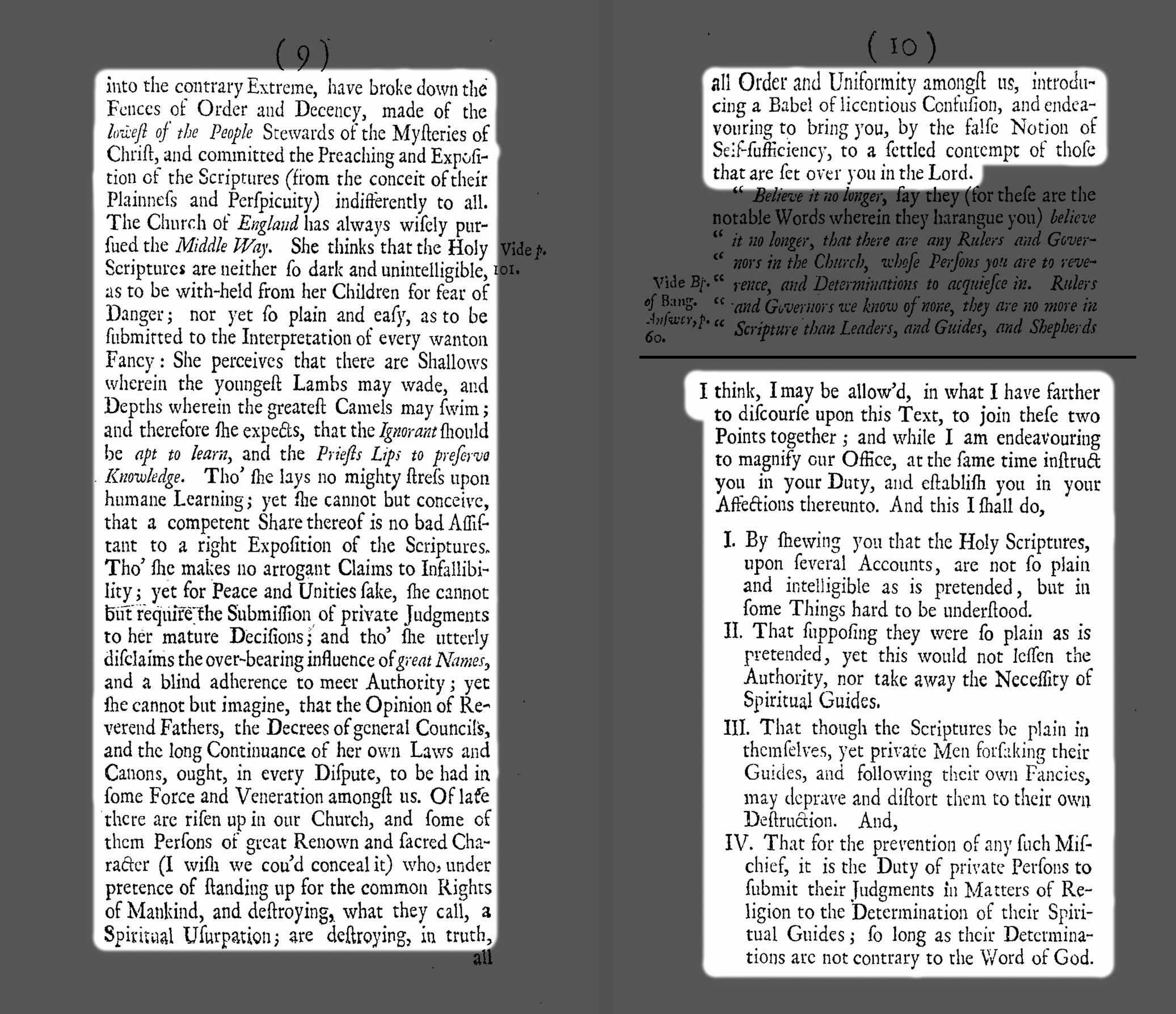
Penance & Discipline.
Injunctions.
[Official document]
June, 1559. A. D.
Art. 21. “… forasmuch as variance and contention is a thing that most displeases God, and is most contrary to the blessed communion of the Body and Blood of our Saviour Christ, curates shall in no wise admit to the receiving thereof any of their cure and flock, which be openly known to live in sin notorious without repentance, or who hath maliciously and openly contended with his neighbour, unless the same do first charitably and openly reconcile himself again”
Art. 46. “… all such as shall be found slack or negligent in resorting to the church, having no great nor urgent cause of absence, they shall straitly call upon them, and after due admonition if they amend not, they shall denounce them to the ordinary.”
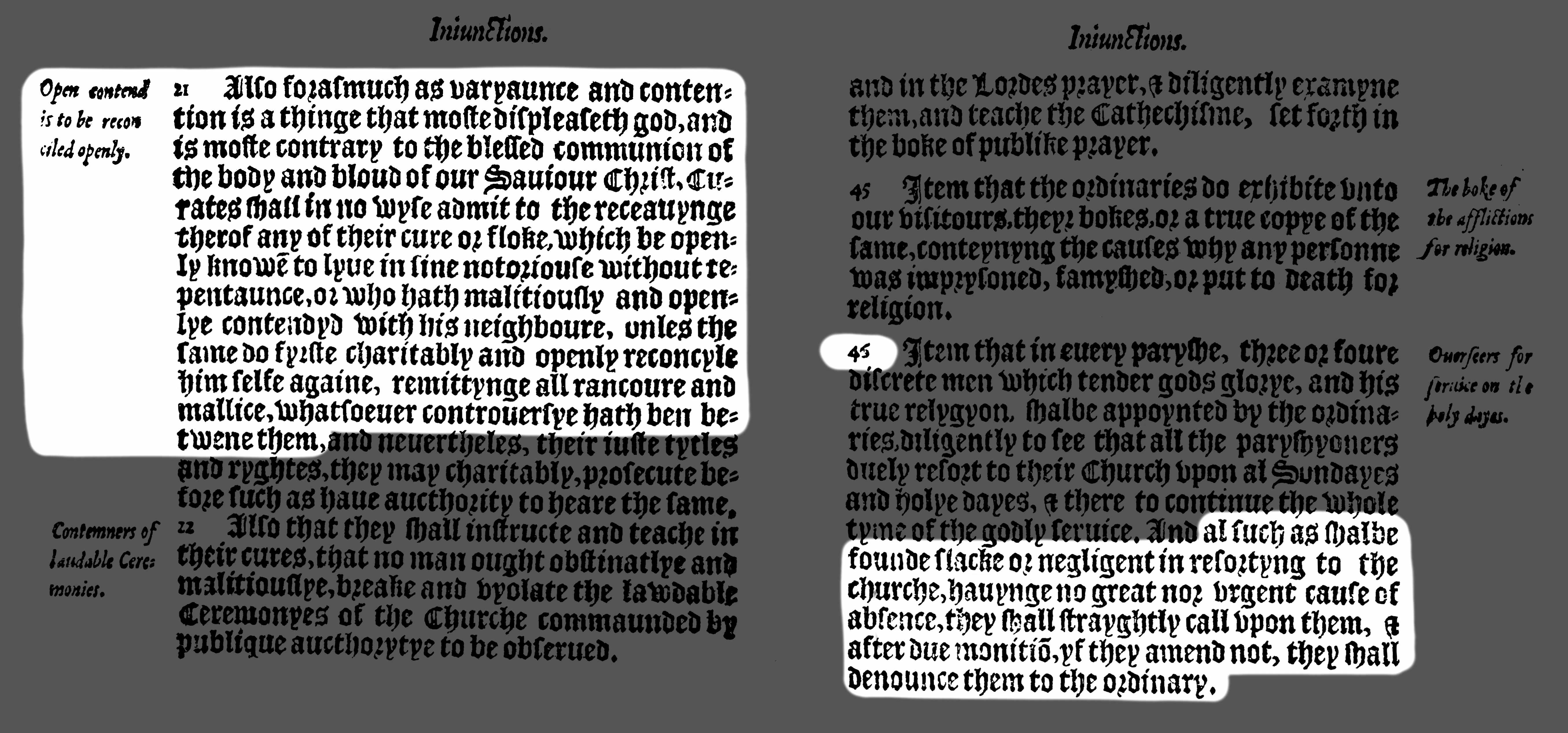
-original pages: Article 21: page 1, page 2. Article 46: page.
Articles prescribed to Ministers.
[Official document]
1560. A. D.
“Civil Laws permit Christians to punish crimes by death.”
“It is permitted for Christians to wage war upon orders of Princes, to vow obedience in case of just reasons, and to claim ownership of private property.”
“A legitimate Matrimony between Christians, initiated & contracted in accord with the Word of God, is indissoluble, and cannot be undone by any human Tradition.”
“Leges Civiles possunt Christianos propter flagitia morte punire.”
“Christianis licet ex jussu Principis bella gerere, & ex justa causa jurare, & propria possidere.”
“Matrimonium inter Christianos legitime juxta Verbum Dei initum & contractum, est indissolubile, nec per Traditiones hominum unquam convellendum.”
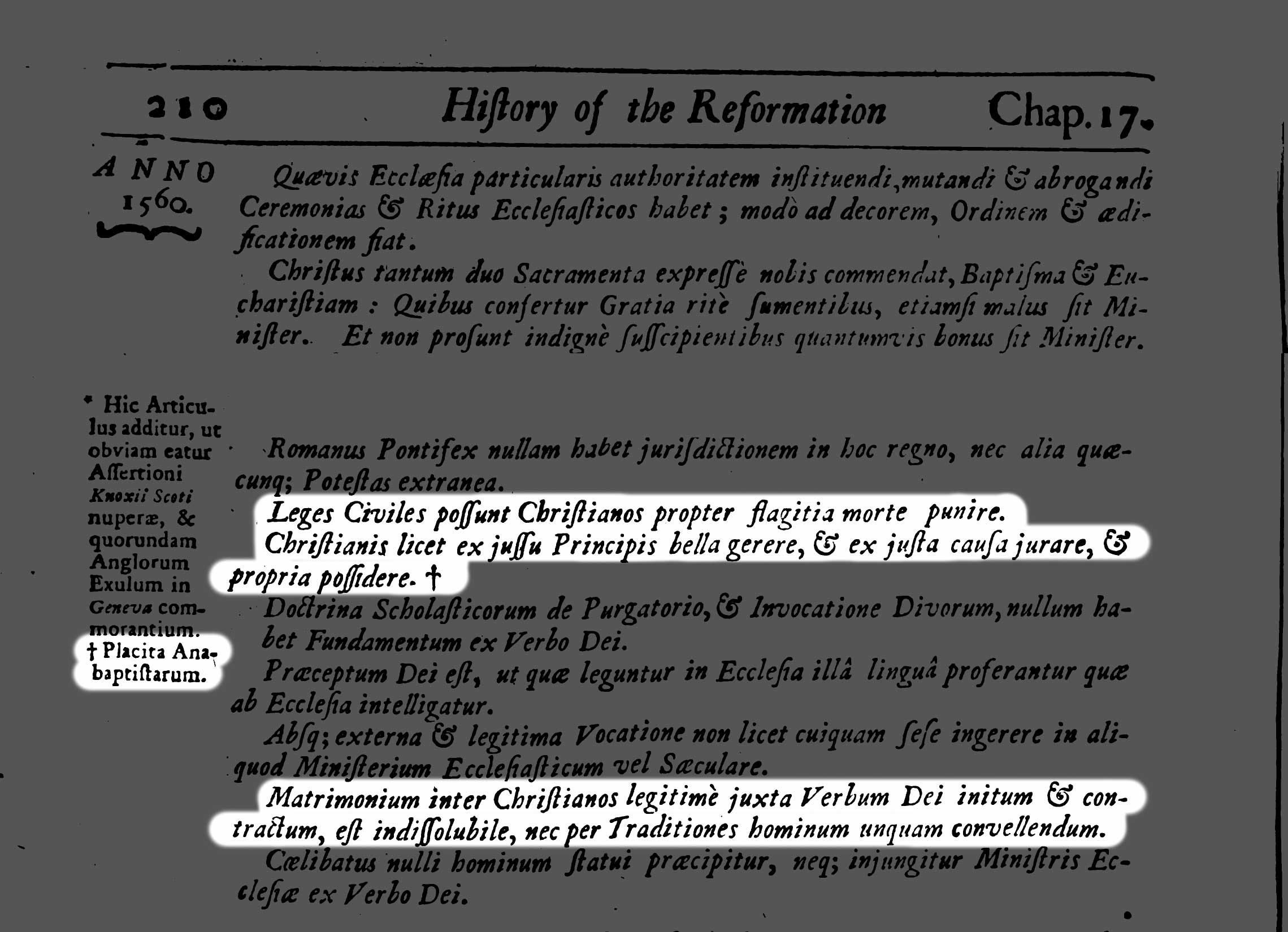
The Articles of Religion.
[Official document]
1563. A. D.
Article 33, Of Excommunicate persons. “The person which by open denounciation of the Church, is rightly cut-off from the unity of the Church, and Excommunicated, ought to be taken from the whole multitude of the faithful, as an heathen and Publican, until he be openly reconciled by Penance, and received into the Church by a judge that hath authority thereunto.”
Articulum XXXIII. Excommunicati vitandi sunt. “Qui per publicam Ecclesiae denuntiationem rite ab unitate ecclesiae praecisus est & excommunicatus, is ab universa fidelium multitudine, donec per poenitentiam publice reconciliatus, fuerit, arbitrio Judicis competentis, habendus est tanquem Ethnicus & Publicanus”

-Source (latin): Articuli de quibus in synodo Londinensi anno Domini iuxta ecclesiae Anglicanae computationem M.D.LXII ad tollendam opinionum dissensionem & firmandum in uera religione consensum (1563); page 1, page 2.
“On the right use of the Church.”
Homilies set out by Authority, and to be read in every parish church.
[Official document]
1563. A. D.
“… according to this example of our Saviour Christ in the primitive Church, which was most holy and godly, and in the which due discipline with severity was used against the wicked, open offenders were not permitted once to enter into the house of the Lord, nor admitted to common prayer, and the use of the holy Sacraments with other true Christians, until they had done open penance before the whole Church. And this was practiced, not only upon low persons, but also upon the rich, noble, and mighty persons, yea, upon Theodosius that puissant and mighty Emperour, whom for committing a grievous and willful murder, Saint Ambrose Bishop of Milan reproved sharply, and did also excommunicate the said Emperour, and brought him to open penance. And they that were so justly exempted and banished from the house of the Lord, were taken for men divided & separated from Christ’s Church, and in most dangerous estate, yea as S. Paul saith, even given unto Satan the devil for a time, and their company was shunned & avoided of all godly men and women, until such time as they by repentance & public penance were reconciled. Such was the honour of the Lord’s house in men’s hearts, and outward reverence also at that time, and so horrible a thing was it to be shut out of the Church and house of the Lord in those days, when religion was most pure, and nothing so corrupt as it lately hath been.”
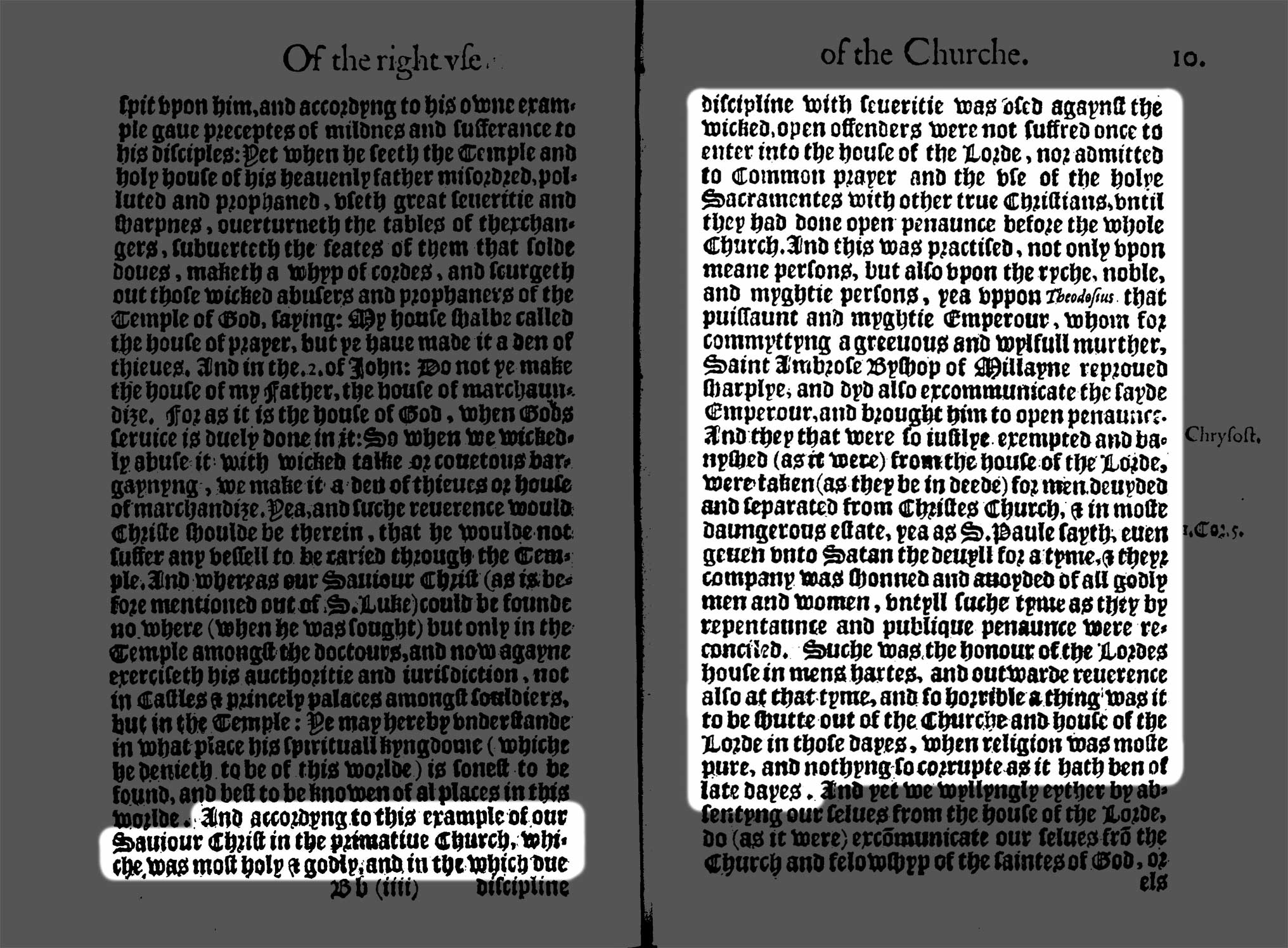
The form of excommunication.
A book of canons concerning some part of the discipline of the Church of England.
[Official document]
1571. A. D.
The form of the sentence of excommunication: “I signify unto you, that A.B. is openly accused of adultery, wherein, the report is, that he hath lived wickedly, and filthily, to his shame and infamy, and grievous offence of the church of God: and for that cause he is cited to the bishops consistory, that his notorious disorder may some way be punished. And because the foresaid A.B. through guiltiness of his wickedness, hath condemned to appear at the day lawfully named, and stubbornly hath withdrawn himself from Justice, and by his example hath harted others to the like stubbornness, therefore, this I further warn you, that our bishop, by the name and authority of the most mighty God, hath excommunicated him from all company of the church of God, & hath cut him off as a dead member, from the body of Christ: In this state, & in so great danger of his soul is he at this time.”
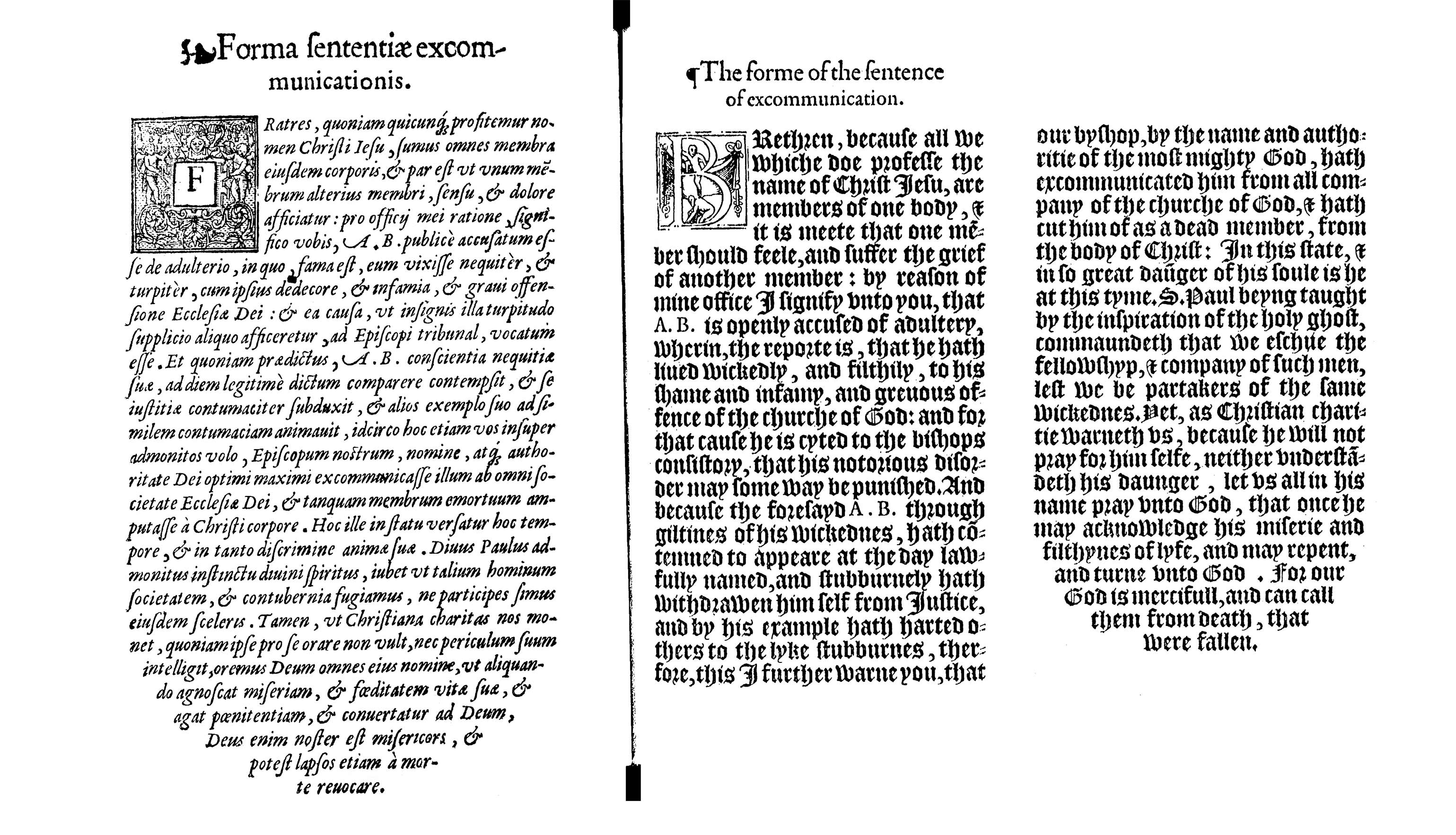
-Source (english): A booke of certaine canons, concernyng some parte of the discipline of the Churche of England (1571); cover page.
A Form of Public Penance.
“A form of penance laid before the synod by the archbishop of Canterbury, with his directions for it.”
[Official document]
1580. A. D.
Archbishop Edmund Grindal: “First, I wish at every public penance a sermon, if it be possible, be had. Secondly, In the same sermon the grievousness of the offence is to be opened; the party to be exhorted to unfeigned repentance, with assurance of God’s mercy, if they so do, and doubling of their damnation, if they remain either obstinate, or feign repentance, where none is, and so lie to the Holy Ghost.
“… Let the offender be set directly over against the pulpit, during the sermon or homily, and there stand bare headed with the sheet, or other accustomed note of difference, and that upon some board raised a foot and a half at least above the church floor, that they may be ‘in loco editiore, et eminentiores omni populo
,’ in an higher place and above all the people.”
“… Provided always that order be given by the ordinaries, when they assign penances, that if the penitents do show themselves irreverent, or impenitent at their penances, that then their punishments be reiterated”

Articles of Convocation
“delivered from the lower house of Convocation.”
[Official document]
1580. A. D.
“… there shall not henceforth be used any commutation of penance, except in rare respects;”
“And here it is earnestly to be desired, that […] there may be some more strait punishment to be assigned by ecclesiastical judges, for adultery, whoredom, and incest, than now by ecclesiastical laws they can do; whether it be by imprisonment joined with open penance, or otherwise.”
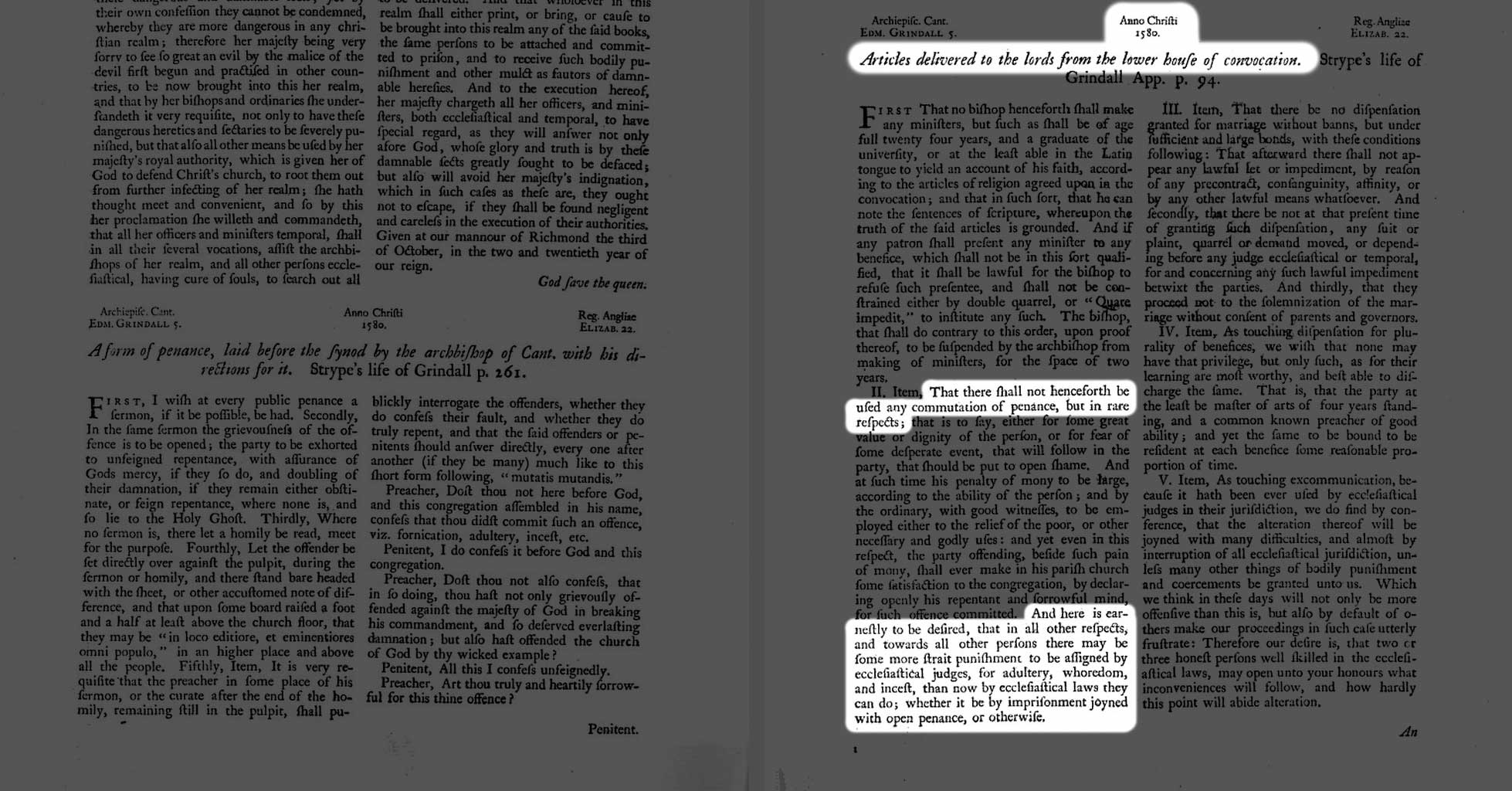
John Whitgift.
“Three Articles” touching Preachers and Other Orders for the Church.
[Official document]
October, 1583. A. D.
Article 4: “That all preachers, and others in ecclesiastical orders, do at all times wear and use such kind of apparel as is prescribed unto them by the book of Advertisements and her majesty’s Injunctions anno primo.”
Article 11: “That from henceforth there be no commutation of penance, except in rare respects and upon great consideration;”

“The Laments of the Church.”
“Querimonia Ecclesiae.”
London, 1592. A. D.
p.29: “The nerves of the most perfect discipline of the Church are cut by those who scorn the ecclesiastical laws, and institute private conventicles; those who inveigh publicly against the Fasts of the church; those who shamelessly violate that episcopal authority which has often provided for my salvation.”
p.81: “Even if our lord Christ has not prescribed every particle of church discipline, he nevertheless laid down common principles, which are required to always be observed in the government of the Church” … “Manifest and grave are the sins of our so-called reformers, in disregarding the will of their Mother, and assaulting her authority.”
p.83: “All the things which the Church of God observes, and Christian societies perpetually keep, is not possible to violate without committing utmost wickedness.” “… the Church of God observes all of the paths that were instituted by the apostles themselves, or their followers: and Christian societies perpetually maintain and everywhere religiously hold fast to them. For in that which the apostles approved there can be no evil; can anyone fear danger in their ways, if he has examined the steps trod by the most pious and celebrated men of all times? All these paths have been ever an aid to the Church; who has ever tried to destroy them? By these paths of the church I mean the 40-day Lenten fast, testified to be instituted by the apostles from Jerome? Or the keeping of church feasts, which in the memory of the benefits we received from Christ, we celebrate throughout the year; which custom likewise came from the apostles, as proved by Augustine? How about the sacred distinctions among the ecclesiastical offices, being consecrated to differing and unequal honor as well as authority? The ranks of the archbishops, metropolitans, and patriarchs, which the history of deepest antiquity declares to have come from the Apostolic era, and endured as a light of the ages even to this day? All these it is not possible to subvert without danger to the church, which logic as well as logic’s helper — experience — confirms in most certain undoubtable ways.”
p.29: “Optimae illi disciplinae resciderunt neruos: qui leges ecclesiasticas venustatis, & conuenientiae causa institutas: qui indicta publice ab ecclesia Jeiunia: qui eam, quae saepe mihi salutem attulit, episcopalem authoritatem improbè violarunt.”
p.81: “Si princeps ille noster Christus, etiamsi non omnes disciplinae partes praescripsit: communes tamen proposuit regulas, quas in regenda Ecclesia semper intueri oportet” … “Graviter certe peccarent nostri reformatores, si matris tantum voluntatem negligerent, & authoritatem oppugnarent.”
p.83: “Quae tota observat dei ecclesia, & perpetuo pro sunt Christianae societati, sine maximo scelere violari non possunt.” “… ita quae tota obseruat dei ecclesia: & instituta sunt ab apostolis, vel apostolicis viris: & perpetuò prosunt Christianae societati, religiosè vbi{que} retinenda iudico. In eo enim, quod approbarunt apostoli, nihil mali continetur: quis periculum in ea via metuet, quam omnium piorum vestigijs tritam, & celebratam perspicit? & quod perpetuò ecclesiae vtilitatem afferet: quis id vnquam rescindendum putabit? In hoc rerum genere comprehēdi existimo ieiunium quadragesimae, quod ab apostolis fuisse institutum locuples author Hieronimus affirmat: & dierum etiam illorum obseruationem, quos in memoriam beneficiorum, quae à Christo accepimus, quotannis celebramus: quem morem ab apostolis similiter dimanasse, Augustinus dicit: & praeterea ecclesiasticorum officiorum distinctiones: dispares inter eos qui sacris sunt deuoti, tum honoris, tum authoritatis gradus: & archiepiscoporum, metropolitarum, at{que} patriarcharum munera, quae, vt ab apostolorum aetate, in hanc vsque diem permansisse lux temporum, & nuncia vetustatis historia declarat: ita non sine ecclesiae pernicie labefactari posse, & ratio, & rationis confirmatrix ipsa experientia certissimè ostendit.”

-Source: Querimonia Ecclesiae (London, 1592); page 1, page 2, page 3. Cover page.
Richard Hooker.
The Laws of Ecclesiastical Polity. Book VI.
c.1600. A. D.
“… church discipline in the form of penance […] is the prime subject of Book VI of Hooker’s Lawes of Ecclesiastical Politie. Following his discussion concerning the nature of spiritual jurisdiction in chapter 1, Hooker, in chapters 2 and 3, distinguishes two types of penitence which this spiritual jurisdiction is to help induce. The first, and primary type of penitence is one’s internal, ‘private dutie towards God’, and the second, an external expression of the first before the Church (Hooker 1981: 6). Throughout the remainder of chapter 3, and the whole of chapter 4, Hooker interacts extensively with the three parts of penance defined by medieval scholastic theology: contrition, confession, and satisfaction. It is in the section on satisfaction that Hooker makes considerable use of the Council of Nicaea’s canon on penance (Hooker 1981: 54). It is this satisfaction, Hooker observes, that ‘importeth Acceptation, Reconciliation and Amitie’ (Hooker 1981: 54- 55). Though, Hooker avers Christ’s ‘one “most pretious and proptiatorie sacrifice” hath thereby once reconciled us to God’, ‘wee are not for that cause to thinck any office of penitence, eyther needles, or fruitles, on our owne behalf: For then would not God require any such duties att our hands’ (Hooker 1981: 55). Moreover, God, because of Christ’s satisfaction and high priestly intercession, accepts such acts of pious devotion (Hooker 1981: 55). Among such deeds, Hooker specifically identifies prayers, fasts, and alms as works of satisfaction (Hooker 1981: 60). Although the penitent could perform such acts privately before God, there were other instances, however, in which the early church insisted they be exhibited publicly before the Church. ‘Now although it suffise, that the offices wherewith wee pacifye God, or private men bee secretly done; yet in cases, where the Church must be alsoe satisfied, it was not to this end and purpose unnecessary, that the ancient discipline did further require outward signes of contrition to be shewed, confession of sinnes to be made openly, and those works to be apparent, which served as testimonies of Conversion before men’ (Hooker 1981: 63). This is where Hooker specifically appropriates the canons of the Council of Nicaea as representing the patristic consensus regarding the necessity of demonstrating the genuineness of repentance before the Church (Hooker 1981: 64). As interpreted by Hooker, the Council of Nicaea’s purpose in emphasizing public penance was the restoration of the penitent to full standing in the Church by way of re-admission to the Eucharist. Moreover, the Council, according to Hooker, vested the bishop with the authority to regulate the severity of the prescribed acts of satisfaction according to the state of the individual penitent. It should be noted that Hooker’s detailed discussion of this canon primarily serves the purpose of critiquing the Roman sacrament of penance, which obscured the force of canonical penance with its stress on auricular confession, as well as its use as a source of revenue.”
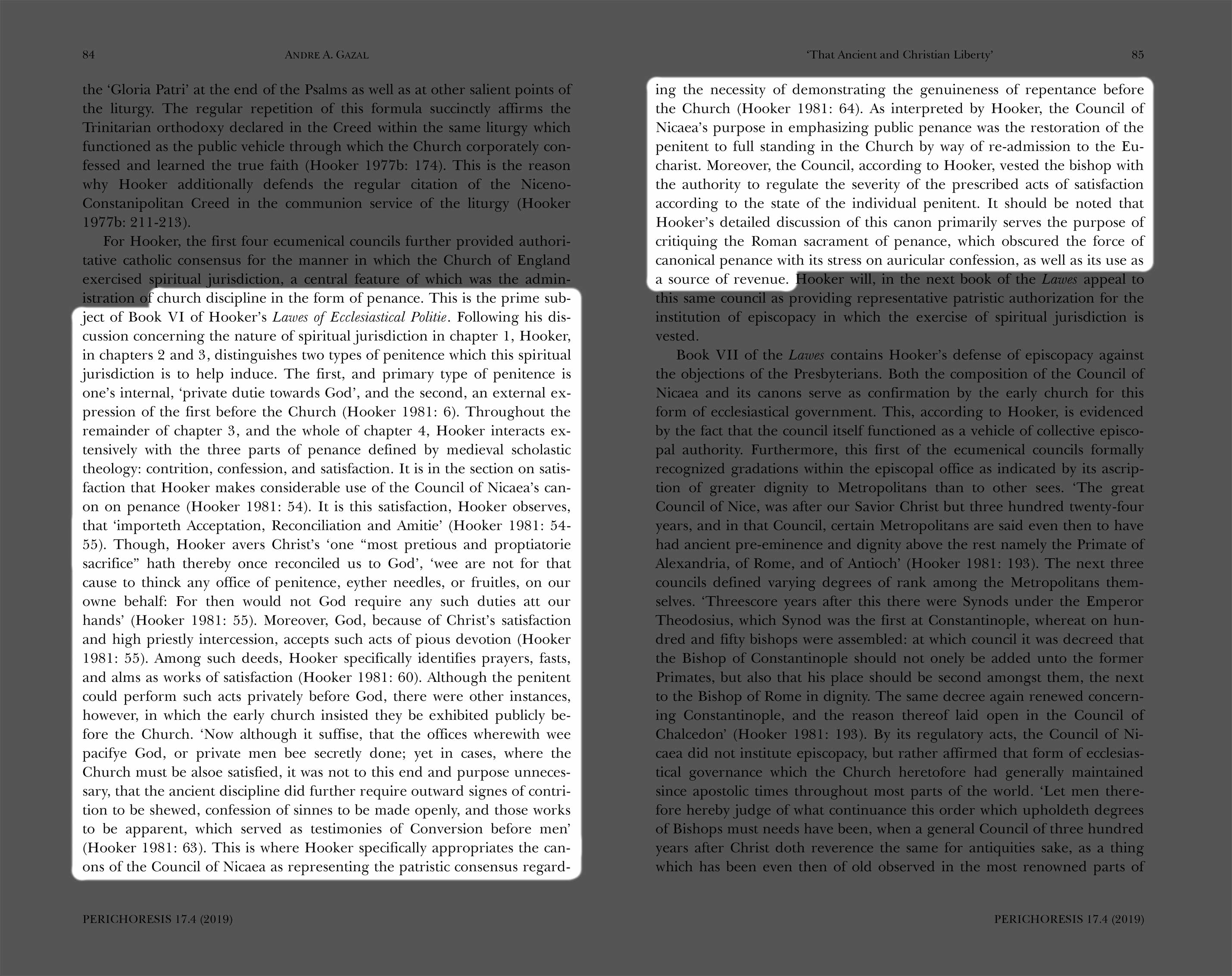
The 1604 Convocation.
Constitutions and canons ecclesiastical treated upon by the convocation the province of Canterbury.
[Official document]
1604. A. D.
Canon CXXXIX: “Whosoever shall hereafter affirm, that the sacred Synod of this nation, in the name of Christ, and by the King’s authority assembled, is not the true Church of England by representation; let him be Excommunicated, and not restored, until he repent and publicly revoke that his wicked Error.”
Canon CXL: “Whosoever shall affirm, that no manner of person, either of the Clergy or Laity, nor being themselves particularly assembled in the said sacred Synod, are to be subject to the decrees thereof in causes ecclesiastical, (made and ratified by the King’s Majesty’s supreme authority,) as not having voices in them; let him be Excommunicated, and not restored until he repent and publicly revoke that his wicked Error.”
Canon V: “Whosoever shall hereafter affirm, That any of the Thirty Nine Articles agreed upon by the Archbishops, and Bishops … are in any part Superstitious or Erroneous, or such as he may not with a good Conscience subscribe unto: Let him be Excommunicated ipso facto, and not restored but only by the Archbishop, after his Repentance and public Revocation of such his wicked Errors.”
Canon LVII: “We do require and Charge everyone seduced by false Teachers to reform that their Willfulness, and to submit to the Order of the Church …”

-Source: Constitutions and canons ecclesiastical treated upon by the Bishop of London, president of the convocation for the province of Canterbury, and the rest of the bishops and clergy of the said province : and agreed upon with the Kings Majesties licence in their synod begun at London, anno Dom. 1603 (1604); cover page.
Canon LXXIV: “The true, ancient, and flourishing Churches of Christ being ever desirous that their Prelacy and Clergy might be had as well in outward reverence, as otherwise regarded for the worthiness of their ministry, did think it fit by a prescript form of decent and comely apparel, to have them known to the people, and thereby to receive the honour and estimation due to the special Messengers and Ministers of Almighty God. We, therefore, following their grave judgment, and the ancient custom of the Church of England, and hoping that in time new-fangledness of apparel in some factious persons will doe of itself, do constitute and appoint, &c.”